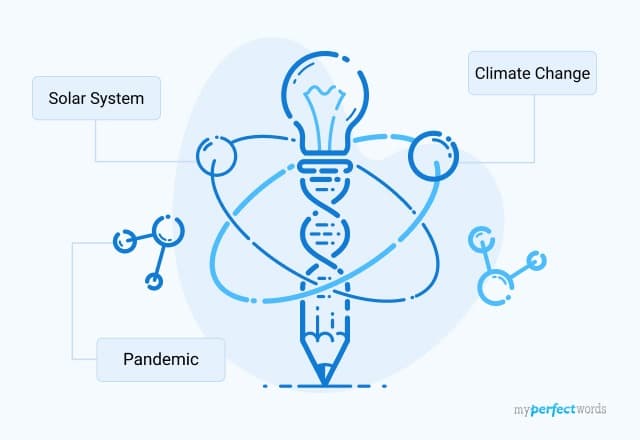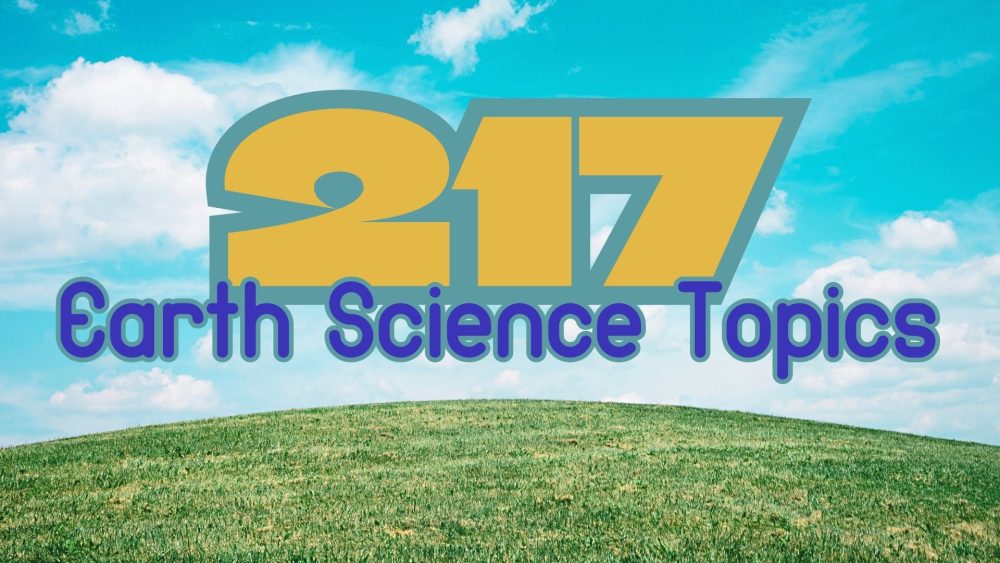
- Customer Reviews
- Extended Essays
- IB Internal Assessment
- Theory of Knowledge
- Literature Review
- Dissertations
- Essay Writing
- Research Writing
- Assignment Help
- Capstone Projects
- College Application
- Online Class

Science Essay Topics: 30+ Interesting Ideas for Your Paper
by Antony W
December 5, 2023

The first step to write a science essay is to choose an area to explore. As such, you have to brainstorm for topics and determine which title would be the most suitable for your paper. Unfortunately, brainstorming isn’t as straightforward, not to mention it won’t give you better results quickly.
A good approach is to look at our list of pre-written ideas, as it makes it easy for you to find a topic that you can explore in your work. Of course, there is no limit to what you can explore. Depending on how many science papers you have to write, you may need a list of one or multiple topics to complete your assignments.
Best Science Essay Topics
From genetics and robotics to physics and biology, here’s a list of 50+ science essay topics that you may find interesting for your next assignment:
Science Information Technology Topics
Science is the reason technology exists. If you think about it, technologists apply scientific knowledge for practical purposes, for which it’s possible to create tools, systems, and solutions that address human needs. Here are some technology topics to consider:
- Analyze information technology’s influence on educational paradigms.
- Do a comprehensive examination of the advantages of cloud computing
- Environmental implications of information technology
- Delve into the ramifications of artificial intelligence
- Write about the contemporary perspectives on the role of robotics in technological advancements.
- You can evaluate the impact of information technology on healthcare systems.
- Analyze the interplay between science fiction and technological progression.
- Do a strategic examination of information technology’s impact on business operations.
Computer Science Essay Topics
Your computer science assignment should focus on exploring technology topics linked to computer science. The essay could be reflective, argumentative, or explanatory in kind. Here are some ideas to consider:
- Explore the impact of artificial intelligence on people’s lives
- How can we use algorithms to solve complex problems?
- What is machine learning, and how does it work?
- What does the future of computer science look like?
- Explore the ethical and legal issues surrounding AI and machine learning.
- Does big data have any implication on human lives?
- Examine the role of robotics in modern technology
- The role of computer science in modern society
- Understanding the basics of coding and software development
Free Features

Need help to complete and ace your essay? Order our writing service.
Get all academic paper features for $65.77 FREE
Data Science Essay Topics
Data science focuses on combination of machine learning, advanced data analytics , specialized programming, and math to examine data. The data extracted and examined can be quite helpful in strategic planning and decision-making. Consider the following for your essay:
- The role of data science in modern society
- What is big data and how can you use it in data analysis today?
- Explore the implications of artificial intelligence on data science.
- The importance of data security and privacy
- Examine the role of machine learning in data science.
- What are the basics of coding and software development?
- What is the future of data science?
- The implications of big data on our lives
- Explore the ethical and legal issues surrounding data science.
Natural Science Topics
Your natural science essay should fall within the theme of the natural world around you. You will need to look at evidence, observation, and constructive imagination to develop reasonable scientific conclusions on how the world around you works. Here are some cool ideas to get you started:
- How do natural disasters affect ecosystems?
- What is the importance of biodiversity?
- Are the effects of pollution reversible?
- What are the different types of renewable energy sources?
- Is deforestation a major contributor to global warming?
- How can we protect marine life from climate change?
- What is the role of genetics and environment in human health?
- What has been the most significant medical discovery?
- How does climate change impact agriculture and food production?
- What are the consequences of overfishing?
- What is the role of technology in sustainable development?
Environmental Science Topics
Your professor expects to see an essay that focuses on the utilization of chemical, physical, and biological elements to explain how humans can deal with ecological issues. Consider the following topics:
- Assess the extent and consequences of human activities on ecosystems
- Propose effective measures to preserve and sustain our ecosystem
- What’s a more holistic approach to resource management and sustainability?
- Understanding, mitigating, and preventing detrimental effects on ecosystem health
- Can we rethink energy sources to alleviate environmental stress and resource depletion?
- Analyze patterns, causes, and projections of global environmental shifts.
- Explain the ecological implications of deforestation.
- Advocating water conservation as a pillar of sustainable development
- Examine the ecological footprint of overpopulation and talk about balancing population dynamics and environmental integrity.
Forensic Science Topics
Forensic science assignment focuses on the application of scientific methods to investigate issue related to law and justice. Investigators use this technique to search crime scenes, collect evidence, process evidence, break their research down, and issue logical outcomes a court can use to issue fair judgments. Lawmakers heavily rely on forensic science to determine whether something did or didn’t take place.
- Explore the integration of forensic science within criminal inquiry and explain applications, techniques, and limitations.
- Write about the the crucial role of forensic science in crime resolution.
- Understanding the path to forensic science expertise: Education, training, and proficiency in investigative techniques
- You can do a comprehensive examination of methodologies and specializations.
- Explain how one can navigate the challenges in forensic science from technological advancements to legal and ethical complexities.
- Can we foresee the evolution and future innovations in forensic science?
- Ethical dilemmas in forensic science: Addressing moral and legal implications in investigative practices
- You can write an essay that analyzes the evolutionary impact of technology in forensic science.
- Societal implications of forensic science: Unpacking contributions, consequences, and public perception
$4.99 Title page
$10.91 Formatting
$3.99 Outline
$21.99 Revisions
Get all these features for $65.77 FREE
About the author
Antony W is a professional writer and coach at Help for Assessment. He spends countless hours every day researching and writing great content filled with expert advice on how to write engaging essays, research papers, and assignments.
472 Science Essay Topics & Good Ideas
18 January 2024
last updated
Science essay topics offer a dynamic range of disciplines, providing vast opportunities to explore, question, and elucidate natural and artificial phenomena. From the microscopic marvels of molecular biology to the cosmic mysteries of astrophysics, each field offers unique insights and challenges. Interdisciplinary subjects, like climate change, artificial intelligence, and genetic engineering, encourage critical thinking and invite complex ethical considerations. Additionally, historical perspectives on scientific revolutions, paradigm shifts, and the role of science in society can offer a better understanding of human relationships With the scientific method. Whether discussing the intricate workings of the human brain in neuroscience or the latest advancements in nanotechnology, science essay topics serve to stimulate intellectual curiosity, promote rigorous investigation, and foster an appreciation for the power and limits of scientific understanding.
Hot Science and Technology Topics
- Exploring Quantum Computing Potential for Modern Infrastructure
- Astronaut Health Concerns: Space Radiation Effects on Human Body
- Biodiversity in Polar Regions: Climate Change Effects
- Synthetic Biology and Its Implications for Medical Science
- Biofuels: Potential for Sustainable Energy Future
- Progress in Nanotechnology and Implications for Healthcare
- Artificial Intelligence in the World of Finance: Opportunities and Challenges
- Interplanetary Travel: Advances in Spacecraft Propulsion
- Gene Editing Technology: Ethical Dilemma in CRISPR
- Smart Cities: Internet of Things in Urban Planning
- Harnessing Tidal Energy: Advances and Environmental Impact
- Machine Learning and Predictive Analysis in Weather Forecasting
- Fusion Energy: Dream or Near Future Reality?
- Microplastics in the Food Chain: A Hidden Threat
- Neuroprosthetics: Bridging the Gap in Neurological Disorders
- Quantum Entanglement and Implications for Secure Communication
- Blockchain Technology Beyond Cryptocurrency: Potential Uses
- Mars Colonization: Challenges and Opportunities for Humanity
- Human-Animal Hybrids: Chimeras in Biomedical Research
- Antimicrobial Resistance: Threats and Advances in Treatment Strategies

Simple Science and Technology Topics
- Exploring the Basics of the Solar System
- What Makes a Rainbow? Understanding Light Refraction
- Photosynthesis: The Lifeline of Green Plants
- Introduction to Smartphones: Technology at Our Fingertips
- Fundamentals of the Internet: How Does It Work?
- Understanding the Weather: Introduction to Meteorology
- Gravity: The Invisible Force that Keeps Us Grounded
- Energy Conservation: Simple Methods and Benefits
- How Do Satellites Orbit Earth? A Simplified View
- DNA: The Blueprint of Life
- Renewable Energy: Harnessing Sun and Wind Power
- Chemistry in the Kitchen: Everyday Science
- Electric Cars: Future of Transportation
- Vaccines: Their Importance and How They Work
- Computer Viruses: The Digital Threat
- Artificial Intelligence: Simplified Overview
- Light Bulbs: Incandescent vs. LED
- Recycling: Process and Its Significance
- Virtual Reality: Immersion Into the Digital World
Interesting Science and Technology Essay Topics
- Unraveling the Mysteries of Quantum Computing
- Black Holes: An Unseen Phenomenon
- Genetic Engineering: The Possibilities and Concerns
- Fascinating World of Augmented Reality
- Bioluminescence: Natural Lighting in Organisms
- Nanotechnology: Miniature Science With Huge Implications
- Probing Into the Depths: Deep Sea Exploration
- Life on Mars: The Quest for Extraterrestrial Existence
- Robotics in Healthcare: A New Revolution
- Climate Change Modeling: Predicting Our Future
- Space Tourism: The New Frontier of Travel
- Cybersecurity: Safeguarding Our Digital Existence
- Artificial Photosynthesis: An Eco-Friendly Innovation
- Human Genome Project: Decoding Our DNA
- Internet of Things: Creating a Connected World
- Cryptocurrency: Disrupting Traditional Finance
- Machine Learning: Teaching Computers to Learn
- Drones: From Warfare to Deliveries
- Telemedicine: The Future of Healthcare
- Synthetic Meat: A New Food Revolution
Science Research Topics for High School Students
- Investigating the Life Cycle of a Star
- Exploring Renewable Energy Sources
- Delving Into Plate Tectonics
- Acid Rain: Causes and Effects
- Understanding Photosynthesis in Plants
- Observing Patterns in Animal Behavior
- Decoding the Chemistry of Cooking
- Human Body: The Wonders of the Circulatory System
- Solar Power: Understanding Photovoltaic Cells
- Analyzing Weather Patterns in Your Region
- DNA Extraction: A Hands-On Study
- Microplastics: A Growing Environmental Concern
- Analyzing the Physics of Sports
- Volcanoes: Understanding Eruptive Behaviors
- Habitat Restoration: Case Studies in Your Area
- Food Chemistry: What Makes Popcorn Pop?
- Earthquakes and Seismic Activity: A Geologic Study
- Ecology: Tracking Local Bird Migrations
- Biodiversity: Cataloging Local Flora and Fauna
Science Research Topics for Middle School
- Mysteries of the Solar System
- Plant Growth: Factors that Influence it
- Chemical Reactions: Baking Soda and Vinegar
- Unveiling the Secrets of Magnets
- Weather Changes: Understanding the Seasons
- Water Cycle: An Essential Life Process
- Butterfly Transformation: A Study of Metamorphosis
- Compost and Decomposition: Nature’s Recycling Process
- Rocks and Minerals: A Geological Examination
- Exploring the Basics of Electricity
- Gravity: The Force that Keeps Us Grounded
- The Moon and Its Phases
- Investigating the Properties of Light
- Animal Adaptations: Survival in Different Habitats
- Discovering Dinosaurs: A Journey to the Past
- Unraveling the Mystery of Rainbows
- Earth’s Atmosphere: Layers and Their Functions
- The Physics Behind Roller Coasters
- Sound Waves and How We Hear
- The Human Digestive System: From Food to Fuel
Science Research Topics for College & University Students
- Emerging Techniques in Genetic Engineering
- Exploring Deep-Sea Biodiversity
- Machine Learning in Health Diagnostics
- Novel Approaches in Renewable Energy
- Advancements in Neuroimaging Techniques
- Climate Change: Coral Reefs at Risk
- New Horizons in Nanotechnology
- Astrophysics: Unfolding the Dark Matter Mystery
- Biomechanics in Sports Science
- Cellular Senescence and Ageing
- Probiotics: Gut Health and Beyond
- Future of Quantum Computing
- Investigating Exoplanets: Life Beyond Earth
- Applications of Artificial Intelligence in Agriculture
- Exploring Human Microbiome
- Drug Resistance in Pathogens
- New Avenues in Cancer Research
- Bioinformatics and Genomic Data Analysis
- The Intersection of Neuroscience and Artificial Intelligence
- Progress in Stem Cell Therapy
Research Paper Topics on Scientific Research Methods
- Emerging Trends in Experimental Design: A Comprehensive Review
- Validity and Reliability of Data Collection Techniques in Social Science Research
- Ethics in Scientific Research: Protecting Participants and Preserving Integrity
- Quantitative vs. Qualitative Research: An In-Depth Comparative Analysis
- Interdisciplinary Research Methods: Harnessing the Power of Diverse Perspectives
- Mixed Method Research Design: Integration of Quantitative and Qualitative Approaches
- Longitudinal Studies in Social Sciences: Challenges and Opportunities
- Innovations in Meta-Analysis Techniques: A Look Into the Future
- Improving the Reproducibility Crisis in Psychological Research: Methodological Considerations
- Sample Size Determination: Statistical Power and Precision in Scientific Research
- Optimizing Research Design for Field Experiments in Ecology and Environmental Science
- Case-Control Studies: Strengthening the Foundation of Epidemiological Research
- Critical Examination of Snowball Sampling in Sociological Research
- Bias and Confounding in Observational Studies: Strategies for Minification
- Utilizing Grounded Theory in Qualitative Research: Benefits and Limitations
- Machine Learning in Research Methodology: Potentials and Pitfalls
- Advent of Big Data Analysis: Revolutionizing Scientific Research Methods
- Computer Simulation Methods in Theoretical Physics: Insights and Applications
- Non-Parametric Statistical Techniques: An Unsung Hero in Scientific Research
Science Argumentative Essay Topics
- Climate Change Consensus: Valid Scientific Agreement or Politicized Rhetoric?
- Artificial Intelligence: Threat or Boon to Human Progress?
- Quantum Computing: An Overhyped Technology or the Future of Computing?
- Genetically Modified Organisms: Solution to Global Hunger or Ecological Time Bomb?
- Legalizing Human Cloning: An Ethical Imperative or a Pandora’s Box?
- Vaccination Skepticism: Lack of Public Trust or Failure of Science Communication?
- Fracking Controversy: Economic Necessity or Environmental Nightmare?
- Nanotechnology in Medicine: Lifesaver or Privacy Invader?
- Space Exploration: Worth the Investment or Waste of Resources?
- Animal Experimentation: Essential for Scientific Progress or Cruel Practice?
- Plastic Waste Management: Can Biodegradable Plastics Save Our Oceans?
- Colonizing Mars: A Future Necessity or a Fanciful Dream?
- Gene Therapy: Miracle Cure or Playing God?
- Neuroenhancement through Drugs: Path to Superintelligence or Ethical Quagmire?
- Antibiotic Resistance: Poor Medical Practice or Inevitable Evolutionary Response?
- Nuclear Energy: Solution to Climate Crisis or an Unmanageable Risk?
- Internet of Things: Convenience Upgrade or Security Threat?
- Stem Cell Research: Breakthrough in Medical Science or Ethical Dilemma?
- Artificial Photosynthesis: Sustainable Energy Solution or Technological Pipe Dream?
- Synthetic Biology: Redefining Life or Trespassing Nature’s Boundaries?
Science Fiction Essay Topics
- Posthumanism in Science Fiction: Analyzing Projections of Human Evolution
- Imagining Utopian and Dystopian Futures in Classic Sci-Fi Literature
- Virtual Reality in Science Fiction: Prophetic Technology or Pure Fantasy?
- Cyberpunk Genre: An Insight Into Societal Fears of Technological Domination
- Artificial Intelligence in Sci-Fi: Exploring the Boundaries of Consciousness
- Alien Cultures in Science Fiction: Reflections on Human Diversity
- Time Travel Paradoxes: A Philosophical Examination in Sci-Fi Narratives
- Space Colonialism in Sci-Fi: Mirroring Historical Imperialism?
- Terraforming in Science Fiction: Feasibility and Ecological Considerations
- Gender and Sexuality in Science Fiction: Breaking Societal Norms
- Quantum Physics in Sci-Fi: Pseudoscience or Plausible Future?
- Bioengineering in Sci-Fi Literature: Moral and Ethical Considerations
- Multiverse Theory in Science Fiction: Exploration of Alternate Realities
- Post-Apocalyptic Narratives in Sci-Fi: Reflections of Global Anxieties
- Transhumanism in Science Fiction: Technological Enhancement and Identity
- Ecological Themes in Science Fiction: Environmental Awareness or Fear Mongering?
- Mental Health Depictions in Sci-Fi: Stereotypes or Progression?
- Surveillance Society in Dystopian Fiction: Paranoia or Prediction?
- Non-Human Intelligence in Sci-Fi: Redefining the Concept of Life
- Nanotechnology in Science Fiction: Potential and Peril
- Posthumanism in Science Fiction: Perspectives on Human Enhancement
- Dystopian Futures: Analyzing Themes of Oppression in Sci-Fi Literature
- Artificial Intelligence in Science Fiction: Constructing Consciousness
- Cyberpunk Genre: Depictions of Society and Technology
- Feminism in Science Fiction: Breaking Stereotypes and Pioneering Voices
- Utopian Ideals: Deconstructing Perfect Societies in Science Fiction
- Extraterrestrial Life in Sci-Fi: Varying Perspectives on Alien Encounters
- Time Travel Paradoxes: A Study of Chronology in Science Fiction
- Ecological Themes in Science Fiction: Envisioning Environmental Futures
- Virtual Reality in Sci-Fi: Intersections of Human Experience and Technology
- Moral and Ethical Dilemmas in Science Fiction: Navigating Grey Areas
- Colonization and Imperialism: Interstellar Explorations in Science Fiction
- Genetic Engineering in Science Fiction: Ethical Quandaries and Possibilities
- Post-Apocalyptic Narratives: Survival and Society in Science Fiction
- Science Fiction and Philosophy: Interplay of Ideas and Concepts
- Language and Communication in Science Fiction: Alien Languages and Codes
- Cyborgs in Science Fiction: Exploring Boundaries of Human and Machine
- Multiverse Theory in Science Fiction: Infinite Realities and Possibilities
- Artificial Reality in Science Fiction: Examining Perception and Existence
- Space and Place in Science Fiction: Constructing Worlds and Environments
Environmental Science Essay Topics
- Climate Change Adaptation: Innovative Strategies in Agriculture
- Sustainable Urban Planning: Green Infrastructure and its Benefits
- Microplastics in Aquatic Ecosystems: Understanding Ecological Consequences
- Deforestation and Biodiversity Loss: Interplay and Conservation Efforts
- Nuclear Power and Environmental Safety: Assessing Long-Term Effects
- E-Waste Management: Challenges and Opportunities for Recycling
- Carbon Capture and Storage: Technological Feasibility and Economic Implications
- Permaculture Design: An Approach to Sustainable Living and Farming
- Hydraulic Fracturing: Analyzing Environmental Costs and Energy Benefits
- Ocean Acidification: A Hidden Consequence of Global Warming
- Greenhouse Gas Emissions From Livestock: Mitigation Strategies
- Endangered Species Protection: Policy Effectiveness and Challenges
- Renewable Energy Integration: Grid Stability and Storage Solutions
- Invasive Species and Ecosystem Dynamics: Case Studies and Management
- Tropospheric Ozone Pollution: Health and Environmental Concerns
- Water Scarcity in Arid Regions: Management and Conservation Techniques
- Sustainable Tourism: Balancing Economic Growth and Environmental Preservation
- Geoengineering Solutions to Climate Change: Ethical and Practical Concerns
- Landfill Waste and Biogas Production: Exploring Sustainable Energy Options
- Ecological Footprint of Fast Fashion: Unraveling Environmental and Social Costs
Astronomy & Space Science Essay Topics
- Exoplanetary Systems: Hunting for Earth-Like Planets
- Pulsars and Neutron Stars: Unveiling Stellar Evolution Endpoints
- Cosmological Models and Dark Energy: Understanding the Accelerating Universe
- Astrobiology: Searching for Signs of Life in the Universe
- Kuiper Belt and Oort Cloud: Investigating the Outer Solar System
- Radio Astronomy: Probing the Invisible Universe
- Supernovae and Cosmic Chemistry: The Creation of Heavy Elements
- Quasars and Active Galactic Nuclei: Powerhouses of the Universe
- Gravitational Waves: A New Era in Astronomical Observations
- Black Hole Paradoxes: Unraveling Mysteries of the Universe
- Interstellar Medium and Star Formation: Galactic Life Cycles
- Solar Flares and Space Weather: Protecting Satellites and Infrastructure
- Astrophotography: Bridging Art and Science in Astronomy
- Mars Exploration: Unveiling the Geology and Climate History of the Red Planet
- Cosmic Microwave Background: Echoes of the Big Bang
- Interplanetary Travel: Technical Challenges and Future Possibilities
- Gamma-Ray Bursts: Unlocking Cosmic Mysteries With High-Energy Astronomy
- Astrochemistry: Deciphering the Chemistry of the Universe
- Dark Matter Search: A Decades-Long Astronomical Puzzle
- Large Scale Structure of the Universe: Deciphering Cosmic Web
History of Science Essay Topics
- Scientific Revolution: Understanding the Shift From Aristotelian to Newtonian Physics
- Alchemical Traditions and the Birth of Modern Chemistry
- Cultural Influences on the Development of Ancient Astronomy
- Medical Practices in the Middle Ages: Between Superstition and Empiricism
- Eugenics Movement of the 20th Century: A Dark Chapter in the History of Genetics
- Philosophical Underpinnings of Quantum Mechanics: Historical Perspective
- Darwin, Wallace, and the Advent of Evolutionary Theory
- The Emergence of Ecological Thought in the 19th Century
- History of Vaccination: From Smallpox to Modern Immunology
- Birth of Cybernetics and the Post-War Information Age
- Feminist Critiques in the History of Science: Addressing Androcentrism
- Industrial Revolution and Its Effect on the Development of Geology
- Advancements in Surgical Techniques: A Historical Review
- Unveiling the Atomic Age: The Manhattan Project and its Consequences
- Milestones in Space Exploration: From Sputnik to the Mars Rovers
- Freud, Psychoanalysis, and the Revolution in Understanding the Human Mind
- Women in Science: Overcoming Barriers and Making Contributions
- Heliocentrism Controversy: Conflict Between Science and the Church
- Climate Science History: Tracing the Discovery of Global Warming
Interactive Science Topics
- Interactive Learning in Physics: Benefits of Simulation-Based Instruction
- Human-Computer Interaction: Influence on Cognitive Development in Children
- Incorporating Augmented Reality in Biology Education: A New Learning Paradigm
- Interactive Data Visualization in Earth Sciences: Enhancing Student Engagement
- Gamification in Science Education: Motivating and Enhancing Learning
- Chemistry and Interactive Learning: Utilizing Virtual Laboratories
- Collaborative Learning in Astronomy: Implementation of Planetarium Software
- Touch-Based Interaction in Geology Education: Use of Tactile Models
- Use of Interactive Whiteboards in Science Classrooms: Advantages and Challenges
- Implementing Interactive 3D Models in Anatomy Education
- Incorporating Virtual Field Trips in Environmental Science Learning
- Using Mobile Applications to Enhance Field Study in Botany
- Crowdsourcing in Citizen Science: Bridging the Gap Between Scientists and the Public
- Interactive Space in Science Museums: Encouraging Hands-On Exploration
- Drones in Ecology Education: An Interactive Approach to Field Study
- Interdisciplinary Approaches in Interactive Science Education: Creating Synergy
- Use of Virtual Reality in Physics Education: A New Learning Experience
- Interactive Online Courses in Molecular Biology: Effectiveness and Challenges
- Hands-On Laboratory Experiments in Home School Science Education
- Pedagogical Approaches for Interactive STEM Learning: Case Studies and Best Practices
Microbiology Science Research Topics
- Microbiome and Human Health: Unraveling Complex Interactions
- Antimicrobial Resistance: Surveillance and Innovative Solutions
- Bacteriophage Therapy: Reviving Old Approaches for New Challenges
- Microbial Ecology in Polar Regions: Surviving Extreme Conditions
- Pathogenomics of Emerging Infectious Diseases: Insights and Implications
- Plant-Microbe Interactions: Harnessing Benefits for Agriculture
- Microbial Biofilms: Formation Mechanisms and Potential Control Strategies
- Metagenomics of Soil Microbial Communities: Unseen Biodiversity
- Fungal Pathogens in Humans: Overcoming Diagnostic Challenges
- Exploring Virulence Factors in Pathogenic Bacteria
- Microbes in Bioremediation: Tackling Environmental Pollution
- Host-Microbe Interactions in Gut: Deciphering the Dialogue
- Virology of Retroviruses: From HIV to HTLV
- Probiotics and Prebiotics: Assessing Therapeutic Potential
- Microbial Genomics: Tools and Applications in Disease Outbreak Investigation
- Understanding Mycotoxin Production in Food Spoilage Fungi
- Exploring the Role of Microbes in Cheese Fermentation
- Investigating Microbial Life in Extreme Environments: Lessons From Astrobiology
- Microbial Contributions to Carbon Cycling: Unravelling Understudied Pathways
- Microbial Forensics: Applications in Bioterrorism and Crime Investigation
Modern Technology Essay Topics
- Artificial Intelligence Ethics: Accountability and Decision-Making
- Augmented Reality in Education: Bridging the Gap Between Theory and Practice
- Biometric Technology: Privacy Concerns and Legal Implications
- Digital Divide: Socioeconomic Factors and Access to Technology
- Electric Vehicles: Assessing Feasibility and Sustainability
- Facial Recognition Technology: An Invasion of Privacy or Security Necessity?
- Genome Editing With CRISPR: Unleashing Potential or Uncontrolled Power?
- Holography: From Science Fiction to Practical Application
- Internet Censorship: Freedom of Speech in the Digital Age
- Li-Fi Technology: Revolutionizing Data Transmission
- Machine Learning in Healthcare: Prospects and Challenges
- Nanotechnology in Medicine: Promise and Pitfalls
- Quantum Computing: Decrypting the Future of Encryption
- Robotic Surgery: Enhancements in Medical Procedures and Patient Outcomes
- Smart Cities: Urban Development in the Digital Age
- Technology in Agriculture: Innovations Transforming Farming Practices
- Virtual Reality Therapy: A New Frontier in Mental Health Treatment
- Wearable Technology: Shaping the Future of Personal Health Monitoring
- 3D Printing: Disrupting Traditional Manufacturing and Construction Processes
Nature Science Essay Topics
- Animal Communication: Deciphering Language in the Animal Kingdom
- Biomimicry: Harnessing Nature’s Solutions for Technological Advancement
- Conservation Efforts in Tropical Rainforests: Successes and Challenges
- Dynamics of Food Chains: Complex Interactions in Ecosystems
- Endangered Species: Investigating Causes and Prevention Strategies
- Forest Fire Ecology: Understanding Regeneration After Wildfires
- Geology of National Parks: A Journey Through Time
- Hydrothermal Vents: Discovering Life in Extreme Environments
- Insect Pollinators and Biodiversity: A Delicate Balance
- Jellyfish Blooms: Unraveling Causes and Consequences
- Kelp Forest Ecosystems: Assessing Vulnerabilities and Resilience
- Life at High Altitudes: Animal Adaptations to Extreme Conditions
- Migration Patterns in Birds: The Science Behind Long Distance Navigation
- Nature’s Pharmacy: Exploring Medicinal Properties of Plants
- Ocean Acidification: Addressing Silent Threat to Marine Ecosystems
- Plastic Pollution in Oceans: Quantifying Effects on Marine Life
- Quantifying Carbon Storage in Forests: Tackling Climate Change
- Reintroduction of Wolves: Ecosystem Changes and Controversies
- Sharks and Ecosystem Balance: Predators’ Crucial Contributions
- Tropical Cyclones: Understanding Formation and Intensification Processes
Neuroscience Essay Topics
- Neural Correlates of Consciousness: An Ongoing Debate
- Brain-Computer Interfaces: Blurring the Line Between Man and Machine
- Neurobiology of Addiction: Unraveling the Neural Circuits
- Memory Consolidation During Sleep: Unveiling the Mechanisms
- Neurogenesis in the Adult Brain: Debunking Old Myths
- Parkinson’s Disease: Investigating Pathogenesis and Potential Therapies
- Synaptic Plasticity: Foundation of Learning and Memory
- Understanding Neurodevelopmental Disorders: Autism Spectrum Disorder
- Optogenetics: Shining Light on Neural Circuits
- Neuroimmunology: Exploring the Brain-Immune System Interaction
- Epigenetics in Neuroscience: Unveiling the Role of DNA Methylation
- Neuroimaging Techniques: Decoding Brain Function and Structure
- Music and the Brain: Cognitive and Emotional Responses
- Neuroanatomy of Emotions: Dissecting the Limbic System
- Stress and the Brain: Neurobiological Consequences of Chronic Stress
- Neuropharmacology of Antidepressants: Mechanisms and Side Effects
- Taste Perception: Delving Into the Gustatory System
- Neuroethics: Moral Considerations in Neuroscience Research
- Investigating the Neurological Basis of Language Processing
Physical Science Topics
- Dark Matter and Dark Energy: Unseen Forces in the Universe
- Quantum Entanglement: Unraveling Spooky Action at a Distance
- Superconductivity: Materials and Applications in Modern Technologies
- Understanding Gravity Waves: New Windows Into the Cosmos
- Chemistry of Pyrotechnics: Color and Combustion
- Thermodynamics in Biological Systems: Energy, Order, and Life
- Astronomical Spectroscopy: Decoding Light From the Distant Stars
- Physics of Black Holes: Exploring the Event Horizon
- Chemical Bonding: Quantum Mechanics and Molecular Shapes
- Nanomaterials in Energy Storage: Advances in Battery Technology
- Quantum Computing: Tapping Into the Quantum World
- Meteorology: Modeling and Predicting Weather Patterns
- Chemistry of Climate Change: Understanding the Greenhouse Effect
- Exploring Exoplanets: Methods and Discoveries
- Physics of Sports: Analyzing Motion and Performance
- Chemistry of Cosmetics: Understanding What’s Under the Lid
- Astronomy and Ancient Civilizations: Celestial Navigation and Timekeeping
- Magnetism and Its Applications in Modern Technologies
- Plasma Physics: Understanding the Fourth State of Matter
- Chemical Reactions at Extreme Temperatures: Probing the Limits
Political Science Essay Topics
- Democratic Transitions in Post-Communist States: Successes and Failures
- Campaign Finance Reform: Analyzing the Implications for Democracy
- Internet and Politics: Social Media’s Influence on Elections
- Foreign Aid Effectiveness: An Examination of Policy and Practice
- Climate Change Policy: A Comparative Study of Global Responses
- Political Polarization: Causes and Consequences in Contemporary Politics
- Gender and Leadership in Politics: A Global Perspective
- Media Bias in Political Reporting: Unraveling Objectivity
- Authoritarian Resurgence: Analyzing the Reverse Wave of Democracy
- International Trade Agreements: Political Considerations and Economic Outcomes
- Global Migration Crisis: Political Responses and Human Rights
- Populism in Contemporary Politics: Causes and Implications
- Terrorism and Counterterrorism: Analyzing Policy Responses
- Political Corruption: Identifying Causes and Finding Solutions
- Non-State Actors in International Relations: Power Beyond States
- Cybersecurity and Statecraft: Navigating Digital Threats in International Politics
- Ethnic Conflict and Political Stability: Case Studies
- Civil Disobedience: Justifying Resistance in Democratic States
- Voting Behavior: Psychological and Sociological Factors
- Political Theory and Artificial Intelligence: Governing the Digital Frontier
Science & Technology in Society Essay Topics
- Digital Divide: Inequalities in Access and Use of Technology
- Artificial Intelligence and Job Displacement: A Future Workforce
- Gene Editing Ethics: CRISPR and the Power to Alter Life
- Social Implications of Autonomous Vehicles: Beyond Engineering Challenges
- Cybersecurity and Privacy: Navigating the Digital Landscape
- Biotechnology in Agriculture: Food Security vs. Environmental Concerns
- Technological Innovations in Healthcare: Balancing Accessibility and Costs
- Space Commercialization: Legal and Societal Issues
- Robotics in Elder Care: An Ethical Examination
- Internet of Things: Societal Risks and Rewards
- Sustainable Energy Technologies: Transitioning to a Greener Future
- Big Data and Surveillance: The Power, Peril, and Politics
- Social Media and Mental Health: A Growing Concern
- Digital Diplomacy: Technology and Foreign Policy
- E-Waste: Technological Advancements and Environmental Consequences
- Climate Change Technology: Geoengineering and Ethical Dilemmas
- Augmented and Virtual Reality: Social Implications and Future Trends
- Nanotechnology: Balancing Progress With Public Health Concerns
- Drones and Society: Privacy, Regulations, and Uses
Science Essay Questions
- Unraveling Quantum Mechanics: How Does It Challenge Classical Physics?
- Brain-Computer Interfaces: A Revolution in Communication or an Ethical Dilemma?
- Artificial Intelligence in Medicine: Panacea or Pandora’s Box?
- Climate Change: How Can Geoengineering Techniques be Effectively and Ethically Utilized?
- Space Exploration: Should We Prioritize Deep Space Missions or Focus on Earth?
- Synthetic Biology: What Are the Implications for Biodiversity Conservation?
- Nanotechnology in Health: What Are the Risks and Rewards?
- Astrobiology: How Probable is the Existence of Extraterrestrial Life?
- Bioluminescence in Deep Sea Creatures: How and Why Does It Occur?
- Neuroplasticity: How Does it Change Our Understanding of the Brain and Mind?
- Genetic Engineering: How Might CRISPR Technology Transform Medicine?
- Human Genome Project: What Are Its Long-Term Implications for Society?
- Epigenetics: How Do Environmental Factors Influence Genetic Expression?
- Antimicrobial Resistance: What Strategies Can Prevent a Post-Antibiotic Era?
- Dark Matter and Dark Energy: How Do They Shape the Universe?
- Particle Physics: What Insights Have Been Gained From the Large Hadron Collider?
- Climate Modeling: How Reliable Are Predictions for Global Warming?
- Stem Cells: What Are the Ethical Boundaries in Their Research and Use?
- Forensic Science: How Reliable Is DNA Profiling in Criminal Investigations?
- Microbiome: How Does Gut Bacteria Influence Health and Disease?
Science Essay Topics That Caused a Sensation
- Unveiling the Human Genome: Breakthroughs and Controversies
- Climate Change: Polarization and Denial in Scientific Discourse
- Crispr-Cas9: The Gene-Editing Tool Revolutionizing Biology
- Artificial Intelligence: Promises, Fears, and Realities
- De-Extinction: Resurrecting Extinct Species Through Science
- Fukushima Daiichi Nuclear Disaster: Lessons Learned
- Voyager 1: Crossing the Threshold Into Interstellar Space
- Internet Privacy and Security: Addressing Cyber Threats
- Nanotechnology: Opportunities and Ethical Dilemmas
- Robotics and Automation: Job Threat or Opportunity?
- SpaceX and Private Space Travel: A New Era in Exploration
- Plastic Pollution: Environmental Impact and Solutions
- Vaccine Debates: Disinformation and Public Health
- Electric Cars: Advancements and Challenges in Mass Adoption
- Gut Microbiome: Influence on Health and Disease
- Antibiotic Resistance: A Looming Health Crisis
- Deepfake Technology: Manipulating Reality in the Digital Age
- Neuralink and Brain-Computer Interfaces: Ethical Concerns
- Machine Learning Algorithms: Bias and Fairness in Artificial Intelligence
Social Science Essay Topics
- Online Identity: Constructing Selfhood in the Age of Social Media
- Cryptocurrencies: Analyzing the Social Aspects of Digital Economies
- Populism in Modern Politics: Tracing Its Rise and Implications
- Intersectionality in Feminist Discourse: Challenges and Perspectives
- Post-Truth Era: Understanding the Decline of Objective Facts in Society
- Cultural Appropriation: Critical Analysis in a Globalized World
- Disinformation and Propaganda: Influence on Democratic Processes
- Crisis of Refugees: Societal Responses and Human Rights Issues
- Hate Speech in Social Media: Examining Causes and Consequences
- Universal Basic Income: A Solution for Income Inequality or a Pipe Dream?
- Youth Activism: Examining Movements for Climate Change and Gun Control
- Postcolonial Theory: Revisiting Histories and Power Dynamics
- Gender and Sexuality: Deconstructing Norms in Contemporary Society
- Cyberbullying: Social Impact and Prevention Strategies
- Body Image and Media: Exploring the Influence on Self-Esteem and Mental Health
- Mental Health Stigma: Uncovering Societal Attitudes and Misconceptions
- Social Impact of Climate Change: Vulnerability and Adaptation Strategies
- Modern Slavery: Unveiling Hidden Forms of Exploitation
- Surveillance Capitalism: Privacy Concerns and Social Implications
- Rise of Nationalism: Impact on Global Politics and International Relations
To Learn More, Read Relevant Articles
652 case study topics & good ideas, 385 odyssey essay topics & ideas.
Science Essay
Learn How to Write an A+ Science Essay
11 min read

People also read
150+ Engaging Science Essay Topics To Hook Your Readers
8 Impressive Science Essay Examples for Students
Science Fiction Essay: Examples & Easy Steps Guide
Essay About Science and Technology| Tips & Examples
Essay About Science in Everyday Life - Samples & Writing Tips
Check Out 5 Impressive Essay About Science Fair Examples
Did you ever imagine that essay writing was just for students in the Humanities? Well, think again!
For science students, tackling a science essay might seem challenging, as it not only demands a deep understanding of the subject but also strong writing skills.
However, fret not because we've got your back!
With the right steps and tips, you can write an engaging and informative science essay easily!
This blog will take you through all the important steps of writing a science essay, from choosing a topic to presenting the final work.
So, let's get into it!
- 1. What Is a Science Essay?
- 2. How To Write a Science Essay?
- 3. How to Structure a Science Essay?
- 4. Science Essay Examples
- 5. How to Choose the Right Science Essay Topic
- 6. Science Essay Topics
- 7. Science Essay Writing Tips
What Is a Science Essay?
A science essay is an academic paper focusing on a scientific topic from physics, chemistry, biology, or any other scientific field.
Science essays are mostly expository. That is, they require you to explain your chosen topic in detail. However, they can also be descriptive and exploratory.
A descriptive science essay aims to describe a certain scientific phenomenon according to established knowledge.
On the other hand, the exploratory science essay requires you to go beyond the current theories and explore new interpretations.
So before you set out to write your essay, always check out the instructions given by your instructor. Whether a science essay is expository or exploratory must be clear from the start. Or, if you face any difficulty, you can take help from a science essay writer as well.
Moreover, check out this video to understand scientific writing in detail.
Now that you know what it is, let's look at the steps you need to take to write a science essay.

Paper Due? Why Suffer? That's our Job!
How To Write a Science Essay?
Writing a science essay is not as complex as it may seem. All you need to do is follow the right steps to create an impressive piece of work that meets the assigned criteria.
Here's what you need to do:
Choose Your Topic
A good topic forms the foundation for an engaging and well-written essay. Therefore, you should ensure that you pick something interesting or relevant to your field of study.
To choose a good topic, you can brainstorm ideas relating to the subject matter. You may also find inspiration from other science essays or articles about the same topic.
Conduct Research
Once you have chosen your topic, start researching it thoroughly to develop a strong argument or discussion in your essay.
Make sure you use reliable sources and cite them properly . You should also make notes while conducting your research so that you can reference them easily when writing the essay. Or, you can get expert assistance from an essay writing service to manage your citations.
Create an Outline
A good essay outline helps to organize the ideas in your paper. It serves as a guide throughout the writing process and ensures you don’t miss out on important points.
An outline makes it easier to write a well-structured paper that flows logically. It should be detailed enough to guide you through the entire writing process.
However, your outline should be flexible, and it's sometimes better to change it along the way to improve your structure.
Start Writing
Once you have a good outline, start writing the essay by following your plan.
The first step in writing any essay is to draft it. This means putting your thoughts down on paper in a rough form without worrying about grammar or spelling mistakes.
So begin your essay by introducing the topic, then carefully explain it using evidence and examples to support your argument.
Don't worry if your first draft isn't perfect - it's just the starting point!
Proofread & Edit
After finishing your first draft, take time to proofread and edit it for grammar and spelling mistakes.
Proofreading is the process of checking for grammatical mistakes. It should be done after you have finished writing your essay.
Editing, on the other hand, involves reviewing the structure and organization of your essay and its content. It should be done before you submit your final work.
Both proofreading and editing are essential for producing a high-quality essay. Make sure to give yourself enough time to do them properly!
After revising the essay, you should format it according to the guidelines given by your instructor. This could involve using a specific font size, page margins, or citation style.
Most science essays are written in Times New Roman font with 12-point size and double spacing. The margins should be 1 inch on all sides, and the text should be justified.
In addition, you must cite your sources properly using a recognized citation style such as APA , Chicago , or Harvard . Make sure to follow the guidelines closely so that your essay looks professional.
Following these steps will help you create an informative and well-structured science essay that meets the given criteria.
Tough Essay Due? Hire Tough Writers!
How to Structure a Science Essay?
A basic science essay structure includes an introduction, body, and conclusion.
Let's look at each of these briefly.
- Introduction
Your essay introduction should introduce your topic and provide a brief overview of what you will discuss in the essay. It should also state your thesis or main argument.
For instance, a thesis statement for a science essay could be,
"The human body is capable of incredible feats, as evidenced by the many athletes who have competed in the Olympic games."
The body of your essay will contain the bulk of your argument or discussion. It should be divided into paragraphs, each discussing a different point.
For instance, imagine you were writing about sports and the human body.
Your first paragraph can discuss the physical capabilities of the human body.
The second paragraph may be about the physical benefits of competing in sports.
Similarly, in the third paragraph, you can present one or two case studies of specific athletes to support your point.
Once you have explained all your points in the body, it’s time to conclude the essay.
Your essay conclusion should summarize the main points of your essay and leave the reader with a sense of closure.
In the conclusion, you reiterate your thesis and sum up your arguments. You can also suggest implications or potential applications of the ideas discussed in the essay.
By following this structure, you will create a well-organized essay.
Check out a few example essays to see this structure in practice.
Science Essay Examples
A great way to get inspired when writing a science essay is to look at other examples of successful essays written by others.
Here are some examples that will give you an idea of how to write your essay.
Science Essay About Genetics - Science Essay Example
Environmental Science Essay Example | PDF Sample
The Science of Nanotechnology
Science, Non-Science, and Pseudo-Science
The Science Of Science Education
Science in our Daily Lives
Short Science Essay Example
Let’s take a look at a short science essay:
Want to read more essay examples? Here, you can find more science essay examples to learn from.
How to Choose the Right Science Essay Topic
Choosing the right science essay topic is a critical first step in crafting a compelling and engaging essay. Here's a concise guide on how to make this decision wisely:
- Consider Your Interests: Start by reflecting on your personal interests within the realm of science. Selecting a topic that genuinely fascinates you will make the research and writing process more enjoyable and motivated.
- Relevance to the Course: Ensure that your chosen topic aligns with your course or assignment requirements. Read the assignment guidelines carefully to understand the scope and focus expected by your instructor.
- Current Trends and Issues: Stay updated with the latest scientific developments and trends. Opting for a topic that addresses contemporary issues not only makes your essay relevant but also demonstrates your awareness of current events in the field.
- Narrow Down the Scope: Science is vast, so narrow your topic to a manageable scope. Instead of a broad subject like "Climate Change," consider a more specific angle like "The Impact of Melting Arctic Ice on Global Sea Levels."
- Available Resources: Ensure that there are sufficient credible sources and research materials available for your chosen topic. A lack of resources can hinder your research efforts.
- Discuss with Your Instructor: If you're uncertain about your topic choice, don't hesitate to consult your instructor or professor. They can provide valuable guidance and may even suggest specific topics based on your academic goals.
Science Essay Topics
Choosing an appropriate topic for a science essay is one of the first steps in writing a successful paper.
Here are a few science essay topics to get you started:
- How space exploration affects our daily lives?
- How has technology changed our understanding of medicine?
- Are there ethical considerations to consider when conducting scientific research?
- How does climate change affect the biodiversity of different parts of the world?
- How can artificial intelligence be used in medicine?
- What impact have vaccines had on global health?
- What is the future of renewable energy?
- How do we ensure that genetically modified organisms are safe for humans and the environment?
- The influence of social media on human behavior: A social science perspective
- What are the potential risks and benefits of stem cell therapy?
Important science topics can cover anything from space exploration to chemistry and biology. So you can choose any topic according to your interests!
Need more topics? We have gathered 100+ science essay topics to help you find a great topic!
Continue reading to find some tips to help you write a successful science essay.
Science Essay Writing Tips
Once you have chosen a topic and looked at examples, it's time to start writing the science essay.
Here are some key tips for a successful essay:
- Research thoroughly
Make sure you do extensive research before you begin writing your paper. This will ensure that the facts and figures you include are accurate and supported by reliable sources.
- Use clear language
Avoid using jargon or overly technical language when writing your essay. Plain language is easier to understand and more engaging for readers.
- Referencing
Always provide references for any information you include in your essay. This will demonstrate that you acknowledge other people's work and show that the evidence you use is credible.
Make sure to follow the basic structure of an essay and organize your thoughts into clear sections. This will improve the flow and make your essay easier to read.
- Ask someone to proofread
It’s also a good idea to get someone else to proofread your work as they may spot mistakes that you have missed.
These few tips will help ensure that your science essay is well-written and informative!
You've learned the steps to writing a successful science essay and looked at some examples and topics to get you started.
Make sure you thoroughly research, use clear language, structure your thoughts, and proofread your essay. With these tips, you’re sure to write a great science essay!
Do you still need expert help writing a science essay? Our science essay writing service is here to help. With our team of professional writers, you can rest assured that your essay will be written to the highest standards.
Contact our essay service now to get started!
Also, do not forget to try our essay typer tool for quick and cost-free aid with your essays!

Write Essay Within 60 Seconds!

Betty is a freelance writer and researcher. She has a Masters in literature and enjoys providing writing services to her clients. Betty is an avid reader and loves learning new things. She has provided writing services to clients from all academic levels and related academic fields.

Paper Due? Why Suffer? That’s our Job!
Keep reading


Science Essay Topics You Can Easily Use for Your Composition

Science essays are significant in academic circles as they provide opportunities for students to explore and understand various scientific concepts deeply. The choice of topic plays a crucial role in shaping the learning journey and fostering a deeper appreciation for scientific inquiry. In this article, we've compiled a list where every science essay topic is designed to cater to diverse interests and encourage critical thinking. Whether you're intrigued by the mysteries of the universe, fascinated by the complexities of life sciences, or passionate about environmental issues, there's something here to spark your curiosity and inspire meaningful exploration. Let's embark on this journey of scientific discovery together. If you don’t have time to research a topic and prepare a draft, let an essay writer online do this job for you.
How to Choose a Topic for Science Essay?
Selecting good science essay topics can be both exciting and challenging. Here are some steps to help you choose the perfect topic:

- Identify Your Interests
Start by considering the areas of science that genuinely fascinate you. Are you passionate about biology, physics, chemistry, astronomy, or another field? Your enthusiasm for the topic will drive your research and writing.
- Consider Relevance
Think about current scientific issues or developments that interest you. Topics that are relevant and timely not only make for engaging essays but also demonstrate your awareness of contemporary scientific discourse.
- Narrow Down Your Focus
Once you have a general idea, narrow down your focus to a specific aspect or question within that field. For example, if you're interested in biology, you could explore a particular aspect of genetics, ecology, or microbiology.
- Research Potential Topics
Conduct preliminary research to explore potential topics further. Look for recent studies, articles, or discussions in scientific journals, news outlets, and reputable websites. This will help you gauge the availability of information and resources on your chosen topic.
- Evaluate Feasibility
Consider the scope and complexity of each potential topic. Ensure that it is feasible to research and write about within the constraints of your assignment or project. Avoid too broad or too narrow topics, as they may be challenging to explore adequately.
- Brainstorm Ideas
Take time to brainstorm ideas and jot down any topic that piques your interest. Don't worry about refining them at this stage—focus on generating a list of potential options.
- Consult with Your Instructor or Peers
If you're unsure about your topic choice, don't hesitate to seek feedback from your instructor or classmates. They can offer valuable insights and suggestions based on their expertise and perspectives.
- Choose a Topic That Excites You
Ultimately, choose a topic that genuinely excites you and sparks your curiosity. Your passion for the subject will shine through in your writing, making for a compelling and engaging essay. If you need help with subjects beyond science, we’d like to remind you about our political science essay writing service .

The Ultimate List of Science Essay Topics
Please consider these science essay topics for school students, which can help kickstart your creativity and help avoid hours of brainstorming decent subject matter for your composition. Are there any other assignments that request your attention? Remember that our book report writing service is here for you around the clock.
Environmental Science Essay Topics
- The importance of recycling in reducing waste.
- Effects of air pollution on human health.
- How to conserve water in daily life.
- The impact of deforestation on biodiversity.
- Renewable energy sources: Solar power vs. wind power.
- Plastic pollution: Solutions for a cleaner environment.
- The role of urban green spaces in mitigating climate change.
- The effects of climate change on wildlife habitats.
- Sustainable agriculture: Practices for preserving soil health.
- Ocean pollution: Causes and solutions.
- The importance of biodiversity conservation.
- Ecosystem services: Understanding nature's benefits.
- The link between human activity and global warming.
- Environmental justice: Ensuring fair treatment for all communities.
- The impact of pesticides on ecosystems and human health.
- Water conservation techniques for homeowners.
- The role of environmental education in promoting sustainability.
- The benefits of composting for soil health and waste reduction.
- The effects of urbanization on natural habitats.
- Green transportation: Alternatives to reduce carbon emissions.
Science Essay Topics for High School Students
- The role of genetics in human health.
- The impact of climate change on local ecosystems.
- Exploring the properties of chemical reactions.
- The future of space exploration: Challenges and opportunities.
- Understanding the brain: Neuroscience and cognitive science.
- Investigating the effects of pollution on water quality.
- Renewable energy solutions for a sustainable future.
- The science behind climate patterns and weather forecasting.
- The biology of infectious diseases: Prevention and treatment.
- Exploring alternative methods of food production and agriculture.
- The physics of motion: Newton's laws and beyond.
- Genetics and ethics: Debates surrounding genetic engineering.
- The chemistry of everyday life: From cooking to cleaning.
- Environmental conservation and biodiversity preservation.
- The role of STEM education in addressing global challenges.
- The impact of technology on human health and well-being.
- Exploring the Universe: Astronomy and Cosmology.
- The importance of conservation biology in protecting endangered species.
- Robotics and automation: Innovations shaping the future.
- Ethical considerations in biomedical research and medicine.
Science Essay Topics for 5th Graders
- How do plants make food?
- Exploring the solar system.
- Why do we see rainbows?
- The wonders of animal adaptations.
- What causes earthquakes?
- Investigating the water cycle.
- Understanding the power of magnets.
- The life of a butterfly.
- What makes the moon shine?
- The marvels of simple machines.
- Why do leaves change color?
- Discovering the world of microorganisms.
- Exploring sound waves.
- The importance of recycling.
- How do birds fly?
- Investigating the life of bees.
- Understanding the seasons.
- Exploring the human body's senses.
- The mysteries of fossils.
- Why is the sky blue?
Science Fiction Essay Topics
- Life on other planets.
- Time travel possibilities.
- Artificial intelligence in society.
- Exploring parallel universes.
- Genetic engineering ethics.
- Colonizing Mars.
- Robots taking over human jobs.
- The future of space exploration.
- Virtual reality experiences.
- Dystopian societies in literature.
- Cloning humans: Pros and cons.
- Nanotechnology advancements.
- The impact of alien contact.
- Cybernetic enhancements in humans.
- Interstellar travel challenges.
- Environmental consequences of advanced technology.
- The concept of alternate dimensions.
- Mind uploading and consciousness.
- Post-apocalyptic survival strategies.
- The role of robots in everyday life.
Political Science Essay Topics
- The importance of voting in a democracy.
- Understanding different political ideologies.
- The role of media in shaping public opinion.
- Globalization and its impact on sovereignty.
- Gender equality in politics.
- The influence of money in elections.
- Political polarization in modern society.
- Human rights violations and international law.
- The challenges of political leadership.
- Immigration policies and social cohesion.
- Environmental policies and sustainability.
- The role of diplomacy in international relations.
- Political corruption and its consequences.
- The impact of social media on political discourse.
- Power dynamics in international organizations.
- The rise of populism in contemporary politics.
- Electoral systems and representation.
- Political participation among youth.
- The balance between security and civil liberties.
- The role of education in fostering informed citizenship.
If you’d like to study business, then using our MBA essay writing service is highly recommended.
Science and Technology Essay Topics
- The future of renewable energy sources.
- Artificial intelligence in daily life.
- Ethical considerations in genetic engineering.
- Advancements in medical technology.
- The impact of social media on society.
- Space exploration and its benefits.
- Cybersecurity challenges in the digital age.
- The role of technology in education.
- Biotechnology and its applications.
- The potential of 3D printing technology.
- Climate change mitigation strategies.
- The internet of things and its implications.
- Robotics in industry and healthcare.
- The importance of data privacy.
- Nanotechnology innovations and risks.
- Virtual reality entertainment and education.
- Biometrics and personal identification.
- The future of transportation technology.
- Quantum computing possibilities.
- Bioethics in modern science and technology.
Forensic Science Essay Topics
- The evolution of forensic science.
- DNA evidence in criminal investigations.
- Forensic techniques in solving cold cases.
- The role of forensic anthropology in identifying human remains.
- Ballistics analysis and its importance in crime solving.
- Digital forensics in cybercrime investigations.
- Forensic entomology: Using insects to solve crimes.
- The significance of forensic toxicology in determining cause of death.
- Bloodstain pattern analysis in crime scene reconstruction.
- Forensic odontology: Identifying individuals through dental records.
- Forensic psychology and criminal profiling.
- The use of forensic chemistry in drug analysis.
- Fire investigation techniques in arson cases.
- Forensic accounting: Uncovering financial fraud.
- The application of forensic botany in criminal cases.
- Gunshot residue analysis and its role in shooting incidents.
- Forensic document examination: Detecting forgery and fraud.
- Forensic nursing in cases of abuse and violence.
- The challenges of forensic science in the courtroom.
- Emerging technologies in forensic investigation.
Computer Science Essay Topics
- The impact of artificial intelligence on society.
- Cybersecurity threats and prevention strategies.
- The evolution of computer programming languages.
- The role of cloud computing in modern business.
- Big data analytics and its applications.
- The future of quantum computing.
- Ethical considerations in data mining.
- Internet of Things: Connecting the world digitally.
- Virtual reality technology and its implications.
- The history and development of computer hardware.
- Machine learning algorithms and their uses.
- Cryptocurrency: The future of finance?
- Mobile app development trends.
- The importance of user interface design.
- Software engineering methodologies.
- The impact of social media on computer science.
- Robotics advancements and automation.
- Bioinformatics: Merging biology and computer science.
- Ethical hacking and cybersecurity ethics.
- The role of computer science in healthcare innovations.
Social Science Essay Topics
- The impact of social media on interpersonal relationships.
- Gender equality in the workplace.
- The effects of globalization on cultural identity.
- Poverty alleviation strategies and their effectiveness.
- The psychology of prejudice and discrimination.
- Urbanization trends and their consequences.
- Family structure and its influence on child development.
- The sociology of crime and deviance.
- Education reform: Challenges and solutions.
- Mental health stigma and its societal effects.
- Environmental conservation and community engagement.
- The sociology of religion: Trends and shifts.
- Immigration policies and social integration.
- The economics of income inequality.
- Political polarization and its impact on society.
- Social movements and their role in social change.
- Aging population: Implications for society.
- The anthropology of food and culture.
- Technology addiction and its effects on social behavior.
- Cultural diversity in multicultural societies.
Puzzled by the number of themes to choose from? Keep calm and simply say, ‘ write my essay for me .’ Our experts will take your task from here.
Earth Science Essay Topics
- The formation of mountains and valleys.
- The water cycle: From rain to rivers.
- Volcanoes: Nature's powerful eruptions.
- The impact of earthquakes on land and society.
- The formation of rocks and minerals.
- Weathering and erosion: Shaping the Earth's surface.
- Plate tectonics: The movement of continents.
- The importance of soil in ecosystems.
- The role of glaciers in shaping landscapes.
- The Earth's atmosphere: Layers and composition.
- The effects of climate change on ecosystems.
- Ocean currents: Patterns and effects on climate.
- Natural disasters: Understanding and mitigating risks.
- The role of rivers in shaping landforms.
- The Earth's magnetic field: Protection and changes.
- The science of fossils and paleontology.
- The impact of human activities on the environment.
- Exploring caves: Underground wonders.
- The study of meteorites and their origins.
- Environmental conservation: Challenges and solutions.
Animal Science Topics for an Essay
- Animal behavior: Understanding communication.
- The role of biodiversity in ecosystems.
- Animal intelligence: Exploring cognitive abilities.
- The impact of climate change on wildlife habitats.
- Veterinary medicine advancements and animal health.
- Endangered species conservation efforts.
- Animal domestication: History and implications.
- The role of zoos in education and conservation.
- Animal ethics: Balancing welfare and research.
- The science of animal migration patterns.
- Wildlife conservation and habitat restoration.
- The importance of pollinators in ecosystems.
- Animal nutrition: Understanding dietary needs.
- The effects of human-wildlife conflict.
- Animal adaptations to survive in different environments.
- The genetics of animal breeding and selection.
- Marine biology: Studying life in the oceans.
- Animal senses: How they perceive the world.
- The social structure of animal societies.
- Ethical considerations in animal experimentation.
Life Science Essay Topics
- Genetics and human health.
- Stem cell research.
- Microbial diversity.
- Climate change impacts.
- Neurobiology insights.
- Evolutionary adaptations.
- Biodiversity conservation.
- Biotechnology in medicine.
- Marine ecological interactions.
- Disease physiology.
- Gene editing.
- Invasive species.
- Nutrition for health.
- Hormones in development.
- Ecological succession.
- Genetic engineering in agriculture.
- Cellular respiration.
- Human microbiome.
- Environmental pollution assessment.
- Genome secrets unraveling.
Data Science Essay Topics
- Data analysis in business decision-making.
- Machine learning applications in healthcare.
- Predictive analytics for customer behavior.
- Big data challenges in government sectors.
- Natural language processing advancements.
- Data visualization techniques and tools.
- Ethical considerations in data science.
- Internet of Things (IoT) data management.
- Fraud detection using data science methods.
- Sentiment analysis in social media data.
- Data-driven approaches to personalized medicine.
- Recommender systems for e-commerce platforms.
- Time series forecasting for financial markets.
- Deep learning for image recognition tasks.
- Data privacy and security concerns.
- Text mining for extracting insights.
- Blockchain technology and data integrity.
- Optimization algorithms in data science.
- Social network analysis for community detection.
- Data science in environmental monitoring.
Health Science Essay Topics
- Role of exercise in mental health.
- Public health interventions for obesity.
- Mental health stigma reduction strategies.
- Health disparities in underserved communities.
- Impact of social determinants on health outcomes.
- Telemedicine's role in healthcare access.
- Nutrition education for children's health.
- Preventive measures against infectious diseases.
- Chronic disease management approaches.
- Importance of vaccination programs.
- Psychological effects of chronic pain.
- Health benefits of mindfulness practices.
- Role of sleep in overall health.
- Access to healthcare in rural areas.
- Effects of pollution on respiratory health.
- Importance of early childhood screenings.
- Mental health support in schools.
- Aging population and healthcare needs.
- Holistic approaches to wellness.
- Integrative medicine in patient care.
Here are additional psychology paper topics if you need more sources of inspiration.
Natural Science Essay Topics
- Climate change impacts on ecosystems.
- Geology of natural disasters.
- Solar system exploration missions.
- Biodiversity conservation strategies.
- Environmental effects of deforestation.
- Ocean acidification's impact on marine life.
- Physics of renewable energy sources.
- Earth's magnetic field and navigation.
- Evolutionary adaptations in wildlife.
- Chemistry of water purification methods.
- Botanical studies on medicinal plants.
- Wildlife conservation efforts in urban areas.
- Atmospheric pollution and its effects.
- Geographical features shaping ecosystems.
- Seismic activity prediction techniques.
- Astronomy discoveries in deep space.
- Ecological restoration projects' effectiveness.
- Genetics and biodiversity preservation.
- Volcanic eruptions' impact on climate.
- Physics of natural phenomena like lightning.
Consulting essay topics gives students valuable guidelines in writing their essays by providing inspiration, direction, and structure. Students engaging with reference topics can gain insights into various subject areas, identify relevant themes, and explore potential research avenues. These topics often offer a starting point for brainstorming ideas, prompting critical thinking, and encouraging deeper exploration of specific subjects. By examining different topics, students can learn to formulate clear research questions, develop coherent arguments, and organize their thoughts effectively. By the way, are you planning to apply for a study grant? Then, use our scholarship easy writing service to increase your odds.
Frequently asked questions
What is the best topic for science, what are some science essay ideas, how to choose a good science essay topic.
She was flawless! first time using a website like this, I've ordered article review and i totally adored it! grammar punctuation, content - everything was on point
This writer is my go to, because whenever I need someone who I can trust my task to - I hire Joy. She wrote almost every paper for me for the last 2 years
Term paper done up to a highest standard, no revisions, perfect communication. 10s across the board!!!!!!!
I send him instructions and that's it. my paper was done 10 hours later, no stupid questions, he nailed it.
Sometimes I wonder if Michael is secretly a professor because he literally knows everything. HE DID SO WELL THAT MY PROF SHOWED MY PAPER AS AN EXAMPLE. unbelievable, many thanks
You Might Also Like
.png)
New Posts to Your Inbox!
Stay in touch
Browse Course Material
Course info.
- Karen Boiko
Departments
- Comparative Media Studies/Writing
As Taught In
- Academic Writing
- Creative Writing
- Nonfiction Prose
Learning Resource Types
The science essay, course description.

You are leaving MIT OpenCourseWare

- Blog Post Top Science Essay Topics
Top Science Essay Topics
Science is an ocean of facts, theories, and hypotheses that can help students learn more important information. Surely you at least once thought how deep the rabbit hole is and what secrets our world holds. Science allows you to look at all modern facts and phenomena differently and discover what can change the world. That is why you need good essay topics to stand out from the crowd and start exploring something amazing.

Computer Science Topics
Many beginners believe that Computer Science is an extremely difficult field of knowledge. However, you should not think stereotypically, especially given the availability of information. There is nothing easier than to study relevant articles and studies to find statistical data. Here are ten great topics to help you prepare a good essay.
- Should states control the Internet space?
- How does machine learning affect the development of computer technology?
- How important is cloud storage in today’s world?
- How does wireless communication affect the human body?
- Should blockchain be integrated into the modern banking system?
- How is virtual reality changing the gaming experience?
- Why does humanity need quantum computers?
- What is the key disadvantage of open source applications?
- Could graphene be a boost for the computer industry?
- Can a person count on anonymity online?
As you can see, each topic is quite original, so that you can stand out from the crowd. For example, start with new technological discoveries, achievements of the past, current crypto trends, or the prospects for the development of the semiconductor industry. Your professor will surely be pleased with your choice. But even if your topic is too tricky, you can always find a writing service and delegate your assignments. For example, thanks to speedypaper.com , you can get a great essay and find out what aspects should be included in each paragraph.
Microbiology Science Topics
Microbiology is a paradise for those who want to know how life appeared on Earth and how single-celled organisms became a springboard for intelligent forms. Moreover, this science includes biochemistry, evolution, physiology, and morphology as an integral part of microbiological processes. Beginners should start with popular and fairly simple topics, as this is the correct solution.
- What biological processes in the human body depend on bacteria?
- What is a negative mutation, and how does it affect single-celled organisms?
- What equipment is needed for cell analysis?
- Is bacterial disease prevention needed in colleges?
- Why do bacteria become resistant to certain groups of antibiotics?
- How has microbiology affected the growth of the pharmaceutical industry?
- What is bacterial colonization, and what is its rate?
- What destructive processes in the human body can be caused by bacteria?
- Is it possible to modify single-celled organisms to create bio-implants?
- How does the development of microbiology affect bioengineering?
As you can see, even a first-year student can find a great topic to start writing. But the problem is that seemingly easy research can be quite tricky, so you have to spend a lot of time searching for information. But what if you’re in a hurry or don’t know where to start? Then you should consider academic assistance as your best chance to get high grades. But which company can you trust? Surely you are looking for an answer to a question like, “ is speedy paper safe ?” That is why you should read at least a few honest reviews and only then decide on your next steps.

Interesting Physical Science Topics
And here are the topics related to the inorganic world and modern research on atoms and molecules. The fact is that physical science allows you to look from a different angle at how the forces of nature and many phenomena are arranged. If you’re interested in the properties of certain elements or compounds, here are some great topics to start with.
- What is the relationship between temperature and heat?
- How does the greenhouse effect impact the Earth’s atmosphere?
- What is the role of Newton in modern Physics?
- How does inertia work, and why is this phenomenon so important?
- The main features of Martian gravity.
- How are ocean tides formed?
- What are the properties of the heaviest matter in the universe?
- Why might gravity be different at the poles?
- How does vacuum affect the thermal conductivity of objects?
- How are magnetic waves formed?
Even these ten topics are enough to start writing an essay and have a great time. But keep in mind that it can be difficult for first-year students to figure out where to start in the first place. That is why you should think about side assistance at least 3-4 days before the deadline. But first, you should read honest mypaperwriter reviews to find out who you shouldn’t trust. Then you can avoid the pitfalls.
Final Words
Science is a world of facts, theories, research, and interesting discoveries. As a student, you have to analyze topics and look for credible sources to gain important knowledge. All of the above options are perfect to surprise your professor. So all you need is the desire and motivation to explore. Surely you will write an excellent essay and learn a lot of new information.
Choose one of the following categories to see related pages:
Share this page.
Austin is the principle web director for Untamed Science and Stone Age Man . He is also the web-director of the series for the High School biology, Middle Grades Science and Elementary Science content. When Austin isn't making amazing content for the web, he's out on his mountain bike or in a canoe.
Science Newsletter:
Full list of our videos.

Teaching Biology?

How to Make Science Films

Read our Wildlife Guide

New From Untamed Science


- Online Calculus Tutors
- Online Geometry Tutors
- Online Algebra Tutors
- Online Trigonometry Tutors
- Online Statistics Tutors
- Online Chemistry Tutors
- Online Macroeconomics Tutors
- Online English Tutors
- Online Physics Tutors
- Online Computer Science Tutors
- Online Accounting Tutors
- Online Biology Tutors
- Online Business Studies Tutors
- Online Finance Tutors
- Online Programming Tutors
- Online Management Tutors
- Online Science Tutors
- Year 2 Maths
- Year 3 Maths
- Year 4 Maths
- Year 5 Maths
- Year 6 Maths
- Year 2 English
- Year 3 English
- Year 4 English
- Year 5 English
- Year 6 English
- Year 7 Maths
- Year 8 Maths
- Year 9 Maths
- Year 10 Maths
- Year 10 Advance Maths
- Year 7 English
- Year 8 English
- Year 9 English
- Year 10 English
- Year 11 General Maths
- Year 11 Chemistry SA,NT
- Year 11 General Mathematics VIC
- Year 11 Mathematical Methods
- Year 11 Mathematics Standard
- Year 11 Chemistry ACT
- Year 11 Mathematics Extension 1
- Year 11 Mathematical Methods SA, NT
- Year 11 Mathematical Methods VIC
- Year 11 Mathematical Applications
- Year 11 Chemistry QLD
- Year 11 Literature ATAR
- Year 11 English - QLD
- Year 11 English Advanced NSW
- Year 11 EALD Level 3
- Year 11 English Language
- Year 11 Essential English M
- Year 11 Essential Skills TAS
- Year 11 Essential English
- Year 11 Bridging EAL
- Year 11 EALD Level 1
- Year 11 Stage 1 Essential English
- Year 11 English General
- Year 11 Mathematics Advanced
- Year 11 EAL
- Year 11 English Standard
- Year 11 EALD ATAR
- Year 12 Mathematics Standard
- Year 12 Further Mathematics
- Year 12 Mathematics Applications
- Year 12 Mathematics Extension 1
- Year 12 Mathematics Methods
- Year 12 Mathematics Advanced
- Year 12 Mathematics Methods VIC
- Year 12 Mathematics Methods - TAS
- Year 12 General Mathematics TAS
- Year 11 English T
- Year 12 Mathematical Methods - QLD
- Year 12 General Mathematics SA, NT
- Year 11 Foundation English
- Year 11 English Studies
- Year 11 Literacy Short Course
- Year 11 English Preliminary
- Year 12 English ATAR
- Year 11 EAL/D
- Year 12 English Extension 2
- Year 12 EAL/D
- Year 12 EALD ATAR WA
- Year 12 English Foundation
- Year 12 English Extension 1
- Year 12 Literature
- Year 12 Stage 2 Essential English
- Year 12 English Literature ATAR
- Year 12 Stage 2 English
- Year 12 EALD Level 2 - TAS
- Year 12 English Advanced NSW
- Year 12 Chemistry VIC
- Year 12 English Language
- Year 12 English Literature T - ACT
- Year 12 English Foundation WA
- Year 12 English Standard NSW Learning Programs
- Year 11 Chemistry WA
- Year 11 Chemistry - VIC
- Year 12 Chemistry - QLD
- Year 12 Chemistry - TAS
- Year 12 Chemistry - WA
- Year 12 Chemistry - NSW
- Year 12 Chemistry - ACT
- Online Tutors in Sydney
- Online Tutors in Melbourne
- Online Tutors in Brisbane
- Online Tutors in Gold Coast
- Online Tutors in Perth
- Online Tutors in Canberra
- Online Tutors in Adelaide
- Online Tutors in Newcastle
- HSC Papers 2019
- HSC Papers 2018
- HSC Papers 2017
Book a Free Demo
Math Calculus Geometry Algebra Trigonometry Statistics Chemistry Economics Macroeconomics English Physics Computer Science Accounting Biology Business Studies Finance Programming Management Science Year 3 Year 4 Year 5 Year 6 Year 7 Year 8 Year 9 Year 10 Year 11 Year 12 College
Search Here
Recent posts.
- General Achievement Test Australia
- ESL vs English Tutoring – What Makes Them Different?
- Know the Grading System in Australia
- GED vs HiSET: All You Need To Know
- HSPT vs PSAT: Which One Is Beneficial For You?
- WordPress.org
- Documentation
- Support Forums
53 Scientist Essay Topic Ideas & Examples
🏆 best scientist topic ideas & essay examples, 📌 most interesting scientist topics to write about, 👍 good research topics about scientist.
- Isaac Newton, Mathematician and Scientist Through his private studies Newton was able to discover numerous theories the primary ones being calculus, optics, the foundation of the theory of light and color, and the law of gravitation.
- Aristotle as the First Political Scientist Although it is possible to consider Aristotle as the first political scientist with references to the aspects of discussing political science in the context of the political philosophy, a lot of researchers also determine the […] We will write a custom essay specifically for you by our professional experts 808 writers online Learn More
- Stephen Hawking: A Prominent Scientist This paper describes the life of Stephen Hawking and his most important works. During his university studies, he was diagnosed with ALS a disease that made him lose the ability to move and speak in […]
- Leonardo da Vinci – Artist, Scientist, Inventor The painting “The Amo Valley” also portrayed some of the best artistic styles. This talent made it easier for Leonardo da Vinci to produce the best paintings.
- Scientist Charles Darwin & Evolution By the year 1846, Darwin had a number of publications relating to zoological and geological discoveries of his expedition works that catapulted him in the scientists front rank.
- Albert Einstein as an Influential Scientist His theories and discoveries still shape our understanding of the universe and will continue to be used to explain and explore the wonders of the cosmos.
- Robin Wall Kimmerer’s Significance as a Scientist However, this botanist replied that this is a wrong approach to science and that inquiries are to be more concrete, deep, and methodological.
- FBI Information Technology and Data Scientist Jobs An FBI IT Specialist supports the FBI facilities with the enactment and daily operations of the computers, printers, and other IT devices.
- Canadian Scientist MacPherson and the Economist Friedman The confrontation between the famous Canadian scientist Macpherson and the American economist Friedman is a vivid example of the collision of two opposite value systems.
- Possibility of Objectivity by an Individual Scientist Generally, evaluating the evidences it appears that an individual scientist can be hardly successful in obtaining objective results of one’s research; whereas when the research is conducted by a group of scientists it is very […]
- Scientist’s Role in Mary Shelley’s Frankenstein The great issues of the day were the main focus of articles as well as the works of fiction that were becoming much more popular as the price of books fell.”The Victorian novel, with its […]
- Scientist-Practitioner Model in Psychology It is clear that the scientific practitioner is not just to read so as to prepare scientists and practitioner psychologists but to read and integrate these roles so that the practice by the psychologist is […]
- Scientist’s Role in “Frankenstein” by Mary Shelly Every action and character in the novel, in this manner, is linked to and affected by the role of the scientist protagonist Victor Frankenstein.
- Christian Scientists in the USA Adopting the idea that Christ is good and the healing is based on the faith, the church’s followers declared the easiness of the principles of Christian Science.
- Should There Be a Limit to What Scientists Can Discover and Create When It Relates to the Wealfare of Humanity? In addition the movement of people and cargo around the world has been improved and safety enhanced due to advances in technology.
- Philosophers and Scientist of Modern Psychology
- Survival of the Prettiest: Harvard Cognitive Scientist Nancy Etcoff on the Science of Beauty
- The Role of University Scientist Mobility for Industrial Innovation
- Overview of Galileo’s Life as a Scientist
- The Knowledge Filter and Economic Growth: The Role of Scientist Entrepreneurship
- The Life and Contributions of Grace Murray Hopper, an American Computer Scientist
- The Indian Air Force As A Scientist All Over The World
- Three Big Data Tools for a Data Scientist’s Toolbox
- Technology Used by Medical Scientist
- The Life and Achievements of Marie Curie, a Well Known Polish Scientist
- The Issue with Science in The Scientist, a Music video by Coldplay
- The Life and Contributions of Scientist James Foucault
- Who Influenced The Scientist? How And Why?
- The Great Muslim Scientist of All the Time
- The Lady Anatomist: The Wax Sculptures of 18th-Century Artist-Scientist Anna Morandi Manzolini
- Understanding the History of a Biomedical Scientists
- The Importance Of A Biomedical Laboratory Scientist
- Why Not to Put a Raincoat on Your Dog: A Cognitive Scientist Explains the Canine Umwelt
- The Contributions of the Artist and Scientist Leonardo da Vinci and the Designer of the Hyper Loop, Elon Musk
- The Strengths and Weaknesses of the Scientist Practitioner Approach
- Scientist and Contributions to the Periodic Table
- Leonardo Da Vinci: Artist Or Scientist
- Mathematician’s Knowledge versus Scientist’s Knowledge
- Women in Science: Einstein’s Advice to a Little Girl Who Wants to Be a Scientist
- International Scientist Mobility and the Locus of Technology Transfer
- The Life of Rene Descartes, a French Philosopher and Scientist
- The Life and Works of Donald Knuth, an American Computer Scientist and Mathematician
- The Perils Of Presidentialism, Political Scientist, By Jose Linz
- The Scientist Who Wanted President Roosevelt to Test His Time Travelling Machine
- The Significance of Language and Its Impact on Scientist’s Morale and Drive
- Karl Landsteiner, The Brilliant And Skillful Scientist
- Leonardo Da Vinci: The First Modern Scientist
- Nathaniel Hawthorne’s Mad Scientist
- The Designer God and the Human Understanding of the Universe in A Catholic Scientist Looks at Evolution by George Coyne
- The Hidden Messages Of Water, Japanese Scientist, Dr. Masaru
- The Great Divide in Scientific Productivity. Why the Average Scientist Does Not Exist
- Scientist as Hero in the 1600s
- The Aid Of A Scientist And The Menace Of A Lobbyist
- Chicago (A-D)
- Chicago (N-B)
IvyPanda. (2024, February 29). 53 Scientist Essay Topic Ideas & Examples. https://ivypanda.com/essays/topic/scientist-essay-examples/
"53 Scientist Essay Topic Ideas & Examples." IvyPanda , 29 Feb. 2024, ivypanda.com/essays/topic/scientist-essay-examples/.
IvyPanda . (2024) '53 Scientist Essay Topic Ideas & Examples'. 29 February.
IvyPanda . 2024. "53 Scientist Essay Topic Ideas & Examples." February 29, 2024. https://ivypanda.com/essays/topic/scientist-essay-examples/.
1. IvyPanda . "53 Scientist Essay Topic Ideas & Examples." February 29, 2024. https://ivypanda.com/essays/topic/scientist-essay-examples/.
Bibliography
IvyPanda . "53 Scientist Essay Topic Ideas & Examples." February 29, 2024. https://ivypanda.com/essays/topic/scientist-essay-examples/.
- Experiment Questions
- Space Exploration Titles
- Expedition Ideas
- Invention Topics
- Discovery Ideas
- Problem Solving Essay Ideas
- Virtualization Essay Titles
- Pseudoscience Topics
- Metaphysics Questions
- Cloning Questions
- Artificial Intelligence Questions
- Eugenics Questions
- Genetic Engineering Topics
- Scientific Revolution Titles
- Research and Development Essay Topics

Return of the descendants
I migrated to my ancestral homeland in a search for identity. It proved to be a humbling experience in (un)belonging
Jessica Buchleitner

Tiny, entangled universes that form or fizzle out – a theory of the quantum multiverse

Neuroscience
How to make a map of smell
We can split light by a prism, sounds by tones, but surely the world of odour is too complex and personal? Strangely, no
Jason Castro

The history of astronomy is a history of conjuring intelligent life where it isn’t

Metaphysics
Simple entities in universal harmony – Leibniz’s evocative perspective on reality

Biography and memoir
Passed over as the first Black astronaut, Ed Dwight carved out an impressive second act

Engineering
A close-up look at electronic paper reveals its exquisite patterns – and limitations

The cell is not a factory
Scientific narratives project social hierarchies onto nature. That’s why we need better metaphors to describe cellular life
Charudatta Navare

Cognition and intelligence
What’s this buzz about bees having culture? Inside a groundbreaking experiment

Earth science and climate
The only man permitted in Bhutan’s sacred mountains chronicles humanity’s impact

The Indian astronomer whose innovative work on black holes was mocked at Cambridge

Anthropology
Societies of perpetual movement
Why do hunter-gatherers refuse to be sedentary? New answers are emerging from the depths of the Congolese rainforest
Cecilia Padilla-Iglesias

Rethinking the homunculus
When we discovered that the brain contained a map of the body it revolutionised neuroscience. But it’s time for an update
Moheb Costandi

Seven years later, what can we make of our first confirmed interstellar visitor?

Is it possible to design a shape to roll along any fixed path?

Science must become attuned to the subtle conversations that pervade all life, from the primordial to the present
David Waltner-Toews

Biotechnology
The two women behind a world-changing scientific discovery

History of technology
Indexing the information age
Over a weekend in 1995, a small group gathered in Ohio to unleash the power of the internet by making it navigable
Monica Westin

Animals and humans
Ant geopolitics
Over the past four centuries quadrillions of ants have created a strange and turbulent global society that shadows our own
John Whitfield

Computing and artificial intelligence
Frontier AI ethics
Generative agents will change our society in weird, wonderful and worrying ways. Can philosophy help us get a grip on them?

The cruelty of crypto
Selling itself as the new American dream, crypto exposes the vulnerable to fraud and scams, and loads risk onto the poor
Rachel O’Dwyer

Why surgery and barbering were one occupation in the Middle Ages

Information and communication
Beware climate populism
The most ardent deniers of anthropogenic climate change today will become the climate conspiracy theorists of tomorrow
Ákos Szegőfi

Artists of our own lives
The genome is the starting point for a performance we enact over a lifetime, not a blueprint we’ve got to follow
Richard O Prum
- How It Works
- All Projects
- All Services
- Write my essay
- Buy essay online
- Custom coursework
- Creative writing
- Custom admission essay
- College essay writers
- IB extended essays
- Buy speech online
- Pay for essays
- College papers
- Do my homework
- Write my paper
- Custom dissertation
- Buy research paper
- Buy dissertation
- Write my dissertation
- Essay for cheap
- Essays for sale
- Non-plagiarized essays
- Buy coursework
- Term paper help
- Buy assignment
- Custom thesis
- Custom research paper
- College paper
- Coursework writing
- Edit my essay
- Nurse essays
- Business essays
- Custom term paper
- Buy college essays
- Buy book report
- Cheap custom essay
- Argumentative essay
- Assignment writing
- Custom book report
- Custom case study
- Doctorate essay
- Finance essay
- Scholarship essays
- Essay topics
- Research paper topics
- Essay samples
- Top Query Link

217 Awesome Earth Science Topics For All Your Essay Needs

Are you ready to embark on an exciting journey into the captivating realm of Earth science? Whether you’re a student seeking inspiration or striving to improve your essay writing skills, this blog post is your ultimate guide. We’ve curated a list of 217 free Earth science topics that will spark your curiosity.
Additionally, we’ll share valuable tips to help you craft stellar essays and research papers that impress your professors. So, grab your pen and let’s dive into the fascinating world of Earth science exploration and effective academic writing!
Let’s Talk About Earth Science Papers
Earth science is a broad scientific discipline that focuses on understanding the Earth’s physical processes, its history and its place within the larger universe. It encompasses various fields of study, including geology, meteorology, oceanography, and astronomy, among others.
A good Earth science essay should effectively convey knowledge and understanding of the subject matter while engaging the reader. Here are some key elements that can contribute to a strong Earth science essay:
- Clear and coherent structure. The essay should have a logical structure with a clear introduction, body paragraphs that present and develop ideas, and a conclusion that summarizes the main points.
- Well-defined thesis statement. The essay should have a central thesis statement that clearly states the main argument or purpose of the essay.
- Accurate and relevant information. The essay should demonstrate a solid understanding of Earth science concepts and incorporate accurate and up-to-date information.
- Critical analysis and interpretation. A good Earth science essay goes beyond presenting information and includes critical analysis and interpretation of the data or concepts being discussed.
- Use of appropriate language. Use clear, concise, and precise language to convey your ideas effectively. Avoid jargon or technical terms that may confuse the reader.
- Visual aids and examples. Utilize visuals, such as diagrams, graphs, or images, to enhance the understanding of complex concepts or data.
- Proper referencing and citations. Give credit to the sources of information used in your essay by citing them properly. Follow a recognized citation style, such as APA, MLA or Chicago.
- Engaging and concise writing style. Keep your writing engaging and concise. Use active voice, varied sentence structures, and avoid unnecessary repetition.
- Proofreading and editing. Before submitting your essay, carefully proofread it for grammar, spelling, and punctuation errors. Also check the overall coherence and flow of ideas.
However, one of the key elements of a great Earth science paper is its topic. A great topic can earn you bonus points from your professor. The good news is that you don’t have to waste any time searching for original topic ideas because we have a comprehensive Earth science topics list for you right here:
Interesting Earth Science Topics
Explore captivating subjects like plate tectonics, volcanoes, and the effects of climate change on ecosystems in our curated list of interesting Earth science topics:
- Plate tectonics: Unveiling the dynamic forces shaping Earth’s crust.
- Climate change impacts: Exploring the effects on ecosystems.
- Volcanic eruptions: Unraveling the mysteries of volcanic activity.
- Weather forecasting: The science behind it.
- Renewable energy sources: Examining sustainable alternatives to fossil fuels.
- Soil erosion: Investigating the causes and impacts on agricultural productivity.
- Geologic hazards: Earthquakes, landslides and their potential dangers.
- Ocean acidification: Consequences of carbon dioxide absorption by oceans.
- Sustainable water management: Balancing human needs with freshwater resources.
- Geological time scale: Unlocking the timeline of Earth’s ancient history.
- Space exploration: Discovering new frontiers beyond our planet.
Earth Science Essay Topics
Craft an engaging essay by choosing from a variety of Earth science essay topics such as the formation of mountains, the impact of erosion or the role of water in shaping Earth’s surface:
- The impact of climate change on coastal erosion and landforms.
- The role of plate tectonics in shaping Earth’s geology.
- The process of weathering and its effects on rock formations.
- Exploring the causes and consequences of volcanic eruptions.
- The significance of water cycles in sustaining life on Earth.
- Understanding the formation and characteristics of different soil types.
- The impact of deforestation on biodiversity and ecosystem services.
- Examining the formation and properties of different types of rocks.
- The role of glaciers in shaping landscapes and contributing to sea-level rise.
- Exploring the causes and consequences of Earthquakes and tsunamis.
- The importance of the ozone layer in protecting Earth from harmful UV radiation.
- Investigating the process of fossilization.
Earth Science Persuasive Essay Topics
Make a compelling argument in your essay by selecting one of our awesome Earth science persuasive essay topics. Take your pick now:
- The urgency of addressing climate change: A call to action.
- Renewable energy sources: The key to a sustainable future.
- The devastating impacts of deforestation: Time to save our forests.
- Ocean acidification: A silent threat to marine life and ecosystems.
- The importance of conserving water: Preserving our most precious resource.
- The alarming rise of plastic pollution: Urgent steps for a cleaner planet.
- The role of geothermal energy in reducing greenhouse gas emissions.
- The significance of biodiversity conservation: Protecting Earth’s web of life.
- Fracking: Balancing energy needs and environmental concerns.
- The impact of air pollution on human health: Time for clean air initiatives.
- Overpopulation: Sustainable solutions for a crowded planet.
- The role of sustainable agriculture in mitigating climate change.
Meteorology Topic Ideas
Dive into captivating meteorology topics such as the causes and consequences of severe weather events with our unique meteorology topic ideas:
- The impact of El Niño on global weather patterns.
- Exploring the formation and characteristics of supercell thunderstorms.
- The role of atmospheric pressure in predicting weather changes.
- Understanding the mechanisms behind hurricane intensification.
- Investigating the effects of climate change on precipitation patterns.
- Analyzing the relationship between air pollution and weather conditions.
- Examining the factors influencing tornado formation and path prediction.
- The significance of cloud types in forecasting severe weather events.
- The role of jet streams in shaping weather patterns across regions.
- Exploring the impact of topography on local microclimates.
- Investigating the link between solar activity and Earth’s climate variability.
Easy Topics In Earth Science
Explore the basics of Earth science with easy topics covering rock types, the water cycle, or different soil characteristics with our list of easy topics in Earth science:
- The formation and types of rocks found on Earth.
- Exploring the water cycle and its importance in Earth’s ecosystems.
- Understanding the movement of Earth’s continents.
- The role of volcanoes in releasing gases.
- Investigating the causes and effects of Earthquakes.
- Exploring the different types and properties of soil on Earth.
- Examining the impact of erosion on landforms and ecosystems.
- The significance of fossils in understanding Earth’s history and evolution.
- Understanding the formation and features karst landscapes.
- Exploring the importance of biodiversity in maintaining Earth’s ecosystems.
- Investigating the effects of climate change on Earth’s polar regions.
- The role of glaciers in shaping landforms and contributing to sea-level rise.
- Understanding the processes of weathering.
Soil Science Topic Ideas
Investigate the role of soil in agriculture, the effects of erosion on ecosystems, or the impact of soil pollution on human health with our original soil science topic ideas:
- Soil erosion: Causes, impacts, and prevention measures.
- Nutrient cycling in agricultural soils: Processes and management strategies.
- Soil pollution: Sources, effects, and remediation techniques.
- Soil pH and its influence on plant growth.
- Soil compaction: Implications for agriculture and remedial practices.
- Organic matter content in soil: Sustainable management practices.
- Soil microbiology: Role of microorganisms in nutrient cycling and soil health.
- Soil fertility management: Enhancing nutrient availability for crop production.
- Soil moisture retention and its impact on plant water uptake.
- Soil classification systems: Understanding soil types and their characteristics.
- Soil remediation techniques for contaminated urban environments.
- Soil carbon sequestration: Strategies for mitigating climate change.

Controversial Topics About Earth
Engage in debates surrounding controversial Earth science topics like fracking or genetically modified organisms (GMOs). Choose one of these exceptional controversial topics about Earth:
- Climate change: Causes, extent and human contribution.
- Fracking: Environmental impacts and potential risks.
- Genetically modified organisms in agriculture: Safety concerns.
- Deforestation: Balancing economic development and environmental conservation.
- Nuclear energy: Benefits, risks and the future of nuclear power.
- Animal agriculture and its impact on greenhouse gas emissions.
- Plastic waste and its effects on marine ecosystems.
- Vaccination versus vaccine hesitancy: Individual rights and societal impact.
- Geoengineering: Manipulating the Earth’s climate as a solution to global warming.
- Overpopulation: Resource depletion, environmental strain and ethical dilemmas.
- Electric vehicles and the future of transportation: Environmental benefits.
Environmental Science Research Topics
Conduct impactful research on environmental science by choosing one of our brand new environmental science research topics. Get bonus points on your paper:
- Impact of deforestation on local biodiversity and ecosystem services.
- Assessing the effectiveness of renewable energy sources in reducing carbon emissions.
- The role of microplastics in contaminating marine food webs.
- Investigating the effects of air pollution on human health in urban areas.
- Examining the relationship between climate change and agricultural productivity.
- Assessing the sustainability of current water management practices in arid regions.
- Evaluating the impact of industrial waste on soil quality.
- Investigating the potential of biofuels as a sustainable alternative to fossil fuels.
- Exploring the effects of ocean acidification on coral reef ecosystems.
- Assessing the ecological implications of invasive species in natural habitats.
- Investigating the link between deforestation and climate change feedback mechanisms.
- Examining the effectiveness of conservation strategies for endangered species.
Earth Science Topics For High School
Impress your teachers and peers by writing a paper on one of our Earth science topics for high school. Yes, all of these are tailored specifically for high school learners:
- The formation and characteristics of volcanoes and volcanic eruptions.
- Investigate the processes of erosion and its impact on landforms.
- Understanding the causes and effects of Earthquakes and seismic activity.
- Explore the dynamics of glaciers and their role in shaping landscapes.
- Investigate the processes involved in the formation of different types of rocks.
- Understanding the composition and layers of the Earth’s atmosphere.
- Explore the formation and features of different types of caves.
- Investigate the causes and impacts of coastal erosion.
- Understanding the formation and characteristics of different types of soils.
- Explore the role of plate tectonics in shaping Earth’s continents.
- Investigate the impact of human activities on the Earth’s environment.
Astronomy Topic Ideas
Embark on a cosmic journey with captivating astronomy topics, exploring the formation of stars and galaxies, exoplanets or the history of space exploration with one of these awesome astronomy topic ideas:
- The life cycle and evolution of stars in the universe.
- Investigate the properties and formation of exoplanets.
- Explore the mysteries of dark matter and dark energy.
- Study the cosmic microwave background radiation and its implications.
- Investigate the existence and nature of black holes.
- Understanding the formation and dynamics of galaxies.
- Explore the origins and composition of the Solar System.
- Investigate the potential for life on other planets and moons.
- Study the properties and behavior of supernovae.
- Understanding the structure and evolution of the universe.
- Explore the phenomenon of gravitational waves and their detection.
- Investigate the nature and properties of quasars and active galactic nuclei.
- Study the relationship between cosmic rays and high-energy astrophysical phenomena.
Earth And Space Science Topics
Uncover the interconnections between Earth and the cosmos with one of our interesting Earth and space science topics. All of these topics are 100% free for your use:
- Investigating the impact of space weather on Earth’s magnetic field.
- Exploring the formation and characteristics of impact craters.
- Understanding the processes associated with satellite collisions.
- Investigating the geologic history of other planets and moons.
- Exploring the role of water on Mars and the potential for past or present life.
- Understanding the interactions between Earth’s atmosphere and space weather events.
- Investigating the potential for asteroid mining.
- Exploring the formation and evolution of planetary systems beyond our own.
- Investigating the impact of coronal mass ejections on Earth’s climate.
- Understanding the role of gravitational forces in shaping celestial bodies.
- Exploring the potential for human colonization of other planets.
Geology Topic Ideas
UnEarth the wonders of geology with topics covering mountain formation, erosion processes, or the geological history of specific regions. Choose one of our geology topic ideas:
- Plate tectonics: The Earth’s shifting puzzle pieces.
- Volcanic eruptions: Unleashing the fury from deep within.
- Geological time scale: Unraveling Earth’s ancient history.
- Rock formations: Sculptures of nature’s geological artistry.
- Fossil record: Clues to life’s past hidden in stone.
- Earthquakes: Tremors that shape the planet’s surface.
- Geothermal energy: Harnessing the Earth’s internal heat.
- Mineralogy: Investigating the building blocks of rocks.
- Sedimentary processes: Layers of Earth’s time-stamped stories.
- Geomorphology: Shaping landforms through natural forces.
- Geological hazards: Understanding and mitigating natural risks.
- Glacial erosion: Carving landscapes with icy precision.
Earth And Environmental Science Topics
Explore the intersection of Earth science and environmental issues with one of these unique Earth and environmental science topics. All our topics should be perfect for 2023:
- Climate change: Understanding the global warming phenomenon.
- Renewable energy: Harnessing sustainable power sources for the future.
- Biodiversity loss: Investigating the decline of Earth’s species.
- Water pollution: Examining the impacts of contaminated water sources.
- Deforestation: Uncovering the consequences of widespread tree removal.
- Ocean acidification: Exploring the effects of carbon dioxide on marine ecosystems.
- Environmental policy: Analyzing the role of legislation in protecting the planet.
- Soil degradation: Assessing the depletion of nutrient-rich soils.
- Air pollution: Investigating the impacts of pollutants on human health.
- Sustainable development: Balancing economic growth with environmental preservation.
Fun Earth Science Topics
Pick one of our fun Earth science topics and start writing your essay in minutes. All of these topic ideas are 100% original and are guaranteed to get you a top grade:
- The wonders of weather: Exploring meteorological phenomena.
- Rocks and minerals: Unveiling the secrets beneath our feet.
- Volcanoes: Nature’s fiery spectacles and their impact.
- The water cycle: From raindrops to oceans and back.
- Ecosystems: Delving into the intricate web of life.
- Plate tectonics: How Earth’s puzzle pieces shape our world.
- Climate change: Unraveling the causes and consequences.
- The power of Earthquakes: Shaking things up with seismic energy.
- The role of glaciers: Carving landscapes and shaping history.
- Fossils: Unlocking ancient mysteries of life on Earth.
- Oceans: Discovering the vast realms beneath the waves.
- The delicate balance of ecosystems: Exploring interconnections.
- Space weather: Studying the Sun’s influence on our planet.
Earth Science Topics To Write About In 2023
Stay up to date with current advancements in Earth science by focusing on topics relevant to 2023. In fact, we have a whole list of Earth science topics to write about in 2023:
- The impact of climate change on coastal erosion patterns
- Emerging technologies for sustainable energy generation and storage
- Advances in predicting and mitigating natural disasters
- Ocean acidification and its effects on marine ecosystems
- Exploring the role of geothermal energy in a carbon-neutral future
- Unraveling the mysteries of Earth’s magnetic field reversals
- Investigating the link between air pollution and human health
- Assessing the long-term impacts of deforestation on climate change
- The role of volcanic activity in climate patterns and atmospheric chemistry
- Understanding the interactions between land, water, and atmosphere
- Analyzing the impacts of urbanization on local climate and biodiversity
Oceanography Topic Ideas
Dive into the depths of oceanography with captivating topics exploring marine ecosystems, climate change impacts on coral reefs, or ocean currents and tides. Here are some great oceanography topic ideas:
- The impact of ocean acidification on marine ecosystems.
- Explore deep-sea hydrothermal vents and their unique organisms.
- Understanding the role of ocean currents in climate regulation.
- The effects of plastic pollution on marine biodiversity.
- Investigate the causes and consequences of coral bleaching.
- Explore the mysterious world of bioluminescence in the ocean.
- Examine the influence of tides on coastal erosion and deposition.
- The role of upwelling in nutrient distribution and marine productivity.
- Investigate the formation and characteristics of ocean gyres.
- Understanding the impact of overfishing on marine food webs.
- Explore the ecological significance of marine protected areas.
- Investigate the link between climate change and ocean circulation.
Engaging Earth Science Topic Ideas
Capture your readers’ attention with engaging topics and write the best essay in your class. Here is a list of brand new and engaging Earth science topic ideas:
- Exploring the mysteries of deep-sea ecosystems.
- Unveiling the forces behind volcanic eruptions.
- The role of climate change in the decline of coral reefs.
- Unraveling the geological history of the Grand Canyon.
- How plate tectonics shape our planet’s surface.
- Investigating the fascinating world of weather patterns.
- The impact of deforestation on biodiversity.
- Understanding the formation of groundwater resources.
- Uncovering the secrets of ancient fossils.
- The science of Earthquakes: mitigating their effects.
- Exploring the consequences of natural disasters.
- The fragile beauty of glaciers.
- Investigating the potential hazards of asteroid impacts on Earth.
- The incredible diversity of rock formations.
- Examining the impact of human activity on ecological systems.
Informative Earth Topics For An Essay
Educate and inform your readers with topics focusing on biodiversity conservation, pollution impacts on ecosystems, or the benefits of renewable energy sources. Pick one of these informative Earth topics for an essay:
- The water cycle: How Earth’s precious resource is recycled
- Volcanoes: The fiery forces that shape the Earth’s landscape
- Coral reefs: Underwater cities of biodiversity
- Plate tectonics: Unraveling the puzzle of Earth’s shifting crust
- Weather patterns: Exploring the science behind rain, wind and storms
- Deforestation: Consequences of losing Earth’s green lungs
- Groundwater: The hidden reservoirs beneath our feet
- Fossils: Clues to the evolution of life
- Earthquakes: Causes, effects and measures for safety
- Hurricanes: The powerhouses of destructive storms
- Glaciers: Frozen giants melting away
- Asteroids: Planetary defense
- Rocks and minerals: The building blocks of Earth’s geology
- Climate change: Human influence on a changing climate
- Ecosystems: Understanding the interconnected web of life on Earth
An Essay Writing Service You Can Trust
An online essay writing service offers students a range of benefits when it comes to crafting Earth science papers. With access to a team of seasoned writers, students always receive high quality, custom written papers from our experts when they buy essay online here. Our service ensures fast turnaround times, providing timely assistance to meet strict deadlines.
Reliable customer support is available to address any inquiries or concerns along the way. By utilizing our secure online platform, students can confidently collaborate with professional writers to create papers that meet the expectations of their professors and teachers in university, college or high school. What are you waiting for? Get an A+ on your next Earth science paper!
What are key steps for writing an Earth science essay?
Research, organize your ideas, create a clear thesis, and provide evidence-based arguments. There are other steps involved, of course. Our expert English essay writing services can help you with your paper if you need assistance.
How to choose a compelling and relevant topic for an Earth science essay?
You should consider current issues, recent discoveries or ongoing research in the field. Or you can just choose one of our topics. We’re updating the list regularly.
How important is proper citation in an Earth science essay?
It is extremely important. Proper citation adds credibility, acknowledges sources and allows verification. Without it, you will get penalized.
What are some strategies for presenting complex concepts in an Earth science essay?
Use clear language, provide examples, make effective use of visuals, and structure your essay logically. Also, don’t forget to take into account the expertise of your audience.
Leave a Reply Cancel reply
Your email address will not be published. Required fields are marked *
Save my name, email, and website in this browser for the next time I comment.
Have a team of vetted experts take you to the top, with professionally written papers in every area of study.
- Write my thesis
- Thesis writers
- Buy thesis papers
- Bachelor thesis
- Master's thesis
- Thesis editing services
- Thesis proofreading services
- Buy a thesis online
- Write my dissertation
- Dissertation proposal help
- Pay for dissertation
- Custom dissertation
- Dissertation help online
- Buy dissertation online
- Cheap dissertation
- Dissertation editing services
- Write my research paper
- Buy research paper online
- Pay for research paper
- Research paper help
- Order research paper
- Custom research paper
- Cheap research paper
- Research papers for sale
- Thesis subjects
- How It Works
80+ Science Research Paper Topics Ideas For Students

Essay writing or writing dissertation is an integral part of education at any level, middle school, high school, or college. Some of the most common essays are on science research topics, and they are also quite interesting. However, choosing research paper topics isn’t as straightforward as you’d like. You’ll need to carry out a survey on and draw inspiration from several scientific research topics before finally choosing one. Choosing science topics, especially if they are argumentative essay topics , to write about can be a frustrating task, especially when science is a pretty wide subject. If you need inspiration on interesting science topics, we’ll give you some science research paper ideas. But, first, let’s talk about how to choose the best science research paper topics – it makes things easier.
What Are Some Science Topics You Can Write About?
Interesting science research topics, ideas of science research topics for high school students, science research topics for college students, science research topics for middle school, scientific research question examples, science presentation ideas, cool science topics to research, ideas of scientific topics for research on nanotechnology, fascinating ideas for science research projects, interesting science topics for high school research papers, tips for choosing science research topics.
Being a very broad subject, students often find choosing a science topic for a research paper difficult. However, the secret is knowing what scientific research questions will make for a good paper, and what people will want to read. So, when choosing science topics for papers, here are tips you can follow to make the task easier.
- Choose cool science topics you’re interested in and that’ll interest your readers.
- Search online for research question examples science for ideas on what your paper should be about.
- Avoid choosing too-broad research topics for high school, to ensure your work is well detailed.
- Consider contemporary scientific research questions concerning recent happenings; they can be fun to write
- Read your notes and online academic papers for inspiration on good science research paper topics.
- Choose simple but highly informative research topics for high school students.
- Choose good science topics you have some knowledge of and can confidently talk about.
- Learn how to choose science topics for high school to make things easier.
- Be familiar with the dos and don’ts of choosing scientific research paper topics.
- Choose a scientific topic for research papers that has enough accessible information.
The Dos and Don’ts of Choosing Science Topics
Knowing the dos and don’ts of choosing a science title helps you select a good topic and ultimately write an outstanding paper. So, when searching for science topics for presentations,
- Do understand that there are different topics in science you can research on;
- Do read extensively for science research paper ideas; it helps you know what to write about;
- Don’t include words like “Research of” or “Study of” in your chosen science topics to research;
- Don’t choose high school science research paper topics with scanty or inaccessible information available;
- Do check online for interesting science research ideas on how to write your paper;
- Feel free to ask your instructor, colleagues, or seniors for scientific research ideas.
When searching for interesting science topics or social media research topics related to science to writing on, you will find different ones on different subjects, which can be confusing. You can follow the tips we listed for choosing science-related topics for a research paper. Meanwhile, here are some science paper topics you can use if none is forthcoming.
- Is there a move for the Covid-19 vaccine?
- What “flattening the curve” means
- Molecular evidence of humans interbreeding with Neanderthals
- Impact of cardio exercise on heart health
- The importance of exploring the solar system
- Can a comet strike the earth?
- The Hubble Space Telescope
- Top ten chemistry careers
- Acid rain effect aquatic plants’ growth
- Room color and human behavior
- How can plants grow in pots?
- Water’s surface tension weight capacity
- What does the paleo diet mean?
- Is Pluto still a planet?
- The future of commercial space flight
- Do you inherit fingerprint patterns?
- Ways in which handwashing prevents the spread of the Covid-19 virus
- Molecular biological research on rare genetic disorders impact on understanding cancer
- Do men pass on genetic abnormalities to their posterity as they age?
- How can men’s exercise affect the traits they pass on to their children?
- Is there really life on Mars; has there ever been?
- Ways of solving the problem of junk space
- The importance of Dark Matter
- Black holes
- Different ways to keep ice from defrosting
- Are pet hairs harmful to the human body?
- Some of the germs you’ve seen in your school
- The effect of music on your assimilation ability
- The types of food dogs prefer the best
- Good hygienic practices for keeping clean
- Foods that develop molds the fastest
- How different body parts aid the effective functioning of the system
- Do worms in the soil really affect plant growth and how?
- Can light brightness make plants grow well?
- What kinds of fertilizers work best, chemical or natural?
- Can mice (or any animal of your choice) learn?
- How can age affect the human reaction?
- Why does water boil faster when put in salt?
- Can food affect the heart, how?
- Can background noise interfere with learning and assimilation?
- Can Higgs Boson destroy the universe?
- Effects of sunspots on man
- Should humans live in space?
- The most important technological innovations in medicinal chemistry in recent years
- The danger of chemicals emitted from pharmaceutical companies
- The importance of big data and bioinformatics to chemical research
- The sugar chemistry behind making candy
- Biomacromolecules
- Trends in India’s medicinal chemistry research
- Nuclear fusion
- Reproduction in mammals
- How do fish mate?
- How useful are science museums in teaching science?
- Why do birds have beautiful feathers?
- The safety of offshore drilling
- The importance of climate change legislation
- Hydraulic fracking’s negative effects
- Uses of microelectronics
- Nanotechnology in medicine
- Nanotechnology for cancer treatment
- Can nanofibers repair brain injuries?
- Effect of nanomedicine on human lifespan
- Nanomaterial
- How nanotechnology helps in patient diagnosis
- How to reduce antibiotic use in agriculture
- The ethics of stem cell research
- The best leukemia treatment
- Gene therapy
- Causes of skin cancer
- Colonoscopy testing on colon cancer
- Why eliminating malaria is difficult
- The possibility of predicting the next pandemic
- Do childhood vaccines prevent diseases?
- How cells shield the body against diseases
- Should wild animals interact with humans?
- Are self-driving cars good?
- Regulating sugar use
- Different types of headaches
- Can migraine cause death?
- The ideal weight for living long
Feel free to choose from this scientific research topics list for your science research paper. There are many things to research where science is concerned, including stem research topics , among others. There is no shortage of scientific topics to research and choosing the best one gets easy when you know how to. If you’ve chosen a topic and you need help writing on them, you can contact our professional writing service. We have a team of experts who can write on any science topic and ensure you meet your deadline.
Leave a Reply Cancel reply
Science - Free Essay Samples And Topic Ideas
Science is the systematic enterprise that builds and organizes knowledge in the form of testable explanations and predictions about the universe. An essay could explore significant scientific discoveries, discuss the methodology and ethics of scientific research, or analyze the impact of science on society, technology, and the environment. A substantial compilation of free essay instances related to Science you can find at Papersowl. You can use our samples for inspiration to write your own essay, research paper, or just to explore a new topic for yourself.
Development of Science in 17th and 18th Century
Science is defined as intellectual and practical actives that involve systematic organization of knowledge obtained through observations and experiment. 17th and 18th centuries are periods where we see human being conducting thorough scientific research which has seen been tested and proven real. It is also through these sessions that technological changes were significantly observed ranging from Revolution of Ideas, a discovery of new machines, widespread of scientific knowledge through learning institutions, improvement in speed work and Institutionalization of well discussed […]
The Science of Happiness
50 students from the California State University, Northridge were used for the research study.All participants are a undergrads in the Psychology program at Cal State Northridge and are 18 years of age or older who are looking to earn credit for their Psy 150 class and signed up voluntarily through SOMA, an online human participant pool which allows students to sign up for studies. Materials The materials used in this study included a debriefing form as well as a consent […]
Animal Testing: is it Ethical?
Animals being sacred gifts given to us, they are the best part of our lives and provide us with a special way of love. They do nothing but bring joy and happiness to us. My whole life I've grown up with all different kinds of animals. I've had a dog named Shelby, two cats Ruby and Smokey, a bird named Cheeks, two hamsters Bernard and Sandy, and I currently have a dog named Rocky and a rabbit named Daisy. I […]
We will write an essay sample crafted to your needs.
Unveiling the Marvels of Jinca: Pioneering Breakthroughs in Science, Technology, and Innovation
Introduction The term "Jinca" represents an eclectic mosaic of outstanding accomplishments in the domains of science, technology, and innovation, standing as a tribute to humanity's ceaseless quest for knowledge and advancement. These remarkable feats span a multitude of fields, ranging from space exploration and medicine to artificial intelligence and sustainable energy, and their profound impact on our world cannot be overstated. In this essay, we will embark on a voyage through the astonishing achievements encompassed by the Jinca category, offering […]
Unraveling Earth’s Mysteries: Alfred Wegener’s Theory in the Realm of Science
At the dawn of the 20th century, the scientific community stood on the brink of a revolutionary understanding of the Earth's surface. Central to this paradigm shift was Alfred Wegener, a German meteorologist and geophysicist whose theory of continental drift challenged the longstanding perceptions of a static Earth. Wegener's hypothesis, initially met with skepticism and even ridicule, eventually laid the groundwork for the modern theory of plate tectonics, fundamentally altering our comprehension of the planet. Wegener's journey into the realms […]
Animal Testing is Unethical, Unreliable and Unnecessary
Every year, 100 million animals sit in U.S laboratories caged and waiting to be burned, abused, and infected (Madhusree 1). The test subjects have few rights, protective services, or liberties. The pictures of restrained tormented animals are hidden in a veil of secrecy amongst red lipsticks, sweetener packets, and paints. What the world desires carries a secret pain, and comes at a cost that often goes unnoticed. Despite the scientific advancements achieved through animal testing, scientists should resort to alternative […]
Science of Shapes: the Integral Role of Proofs in Geometry
One of the core areas of mathematics is geometry, which is the study of forms, sizes, relative locations, and spatial features. The comprehension and use of geometric concepts are fundamentally dependent on proofs, which are organized arguments that employ deductive reasoning to derive a conclusion from a presumption known as an axiom. The nature of geometric proofs, their importance in the field of mathematics, and their role in fostering a better comprehension of geometric ideas are all examined in this […]
Science and Speculation: Unraveling Area 51 Conspiracy Theories
Area 51, an air force facility situated in Nevada that is classified as such, has endured for decades as a location enveloped in mystery and intrigue, providing an ample substrate for an abundance of conspiracy theories. Due to the government's initial reluctance to acknowledge its existence, the secrecy surrounding the base has sparked widespread speculation and curiosity. This essay investigates the prevailing Area 51 conspiracy theories, scrutinizes their provenance, and assesses their influence on popular culture and public opinion. Evidence […]
Pros and Cons of Animal Testing
Aside from what anyone thinks animal testing does has positives, although some might argue that they don't outweigh the negatives. Testing on a living organism could be more accurate than a small percentage of alternatives. It also gave us a much better understanding of our own anatomy considering before we tested on animals we thought our lungs pumped our blood throughout our body(Animal Experimentation). Also animal testing has given us an insight on the effectiveness of medications developed to combat […]
Fizz, Fun, and Science: Exploring the Diet Coke and Mentos Reaction
A fascinating and dramatic illustration of chemistry and physics concepts is the Diet Coke and Mentos reaction. This unusual and fascinating response has attracted a lot of attention due to its instructive potential as well as its amazing outcomes. We will go into the science behind this fascinating experiment in this article and examine its history, workings, and instructional value. Dropping Mentos candies into a bottle of Diet Coke is the straightforward yet aesthetically striking experiment known as the "Diet […]
Isaac Newton’s Accomplishments: Pioneering the Science Revolution
Isaac Newton, a figure immortalized in the chronicles of science, has made a profound and lasting impact on society through his revolutionary achievements. In addition to the widely recognized metaphor of an apple plummeting from a tree, his contributions culminated in the development of the law of universal gravitation. Newton's contributions to astronomy, physics, and mathematics not only initiated a paradigm shift in these disciplines but also established a substantial portion of the contemporary scientific paradigm. Newton, who was born […]
Animal Testing in Medical and Cosmetic Research
Every year there is less and less animal testing done in both medical and cosmetic research. There are plenty of reasons as to why animal testing has been proven to be effective in research experiments. While the beginnings of animal testing were not entirely reassuring of its tactics in the process of testing . However with the time animal testing has been around, it has greatly improved with the advancement of regulations and technology put towards animal testing. Therefore, animal […]
Interstellar Movie Review: a Journey through Science and Speculation
Interstellar: A Cinematic Marvel Grounded in Science The movie Interstellar is a 2014 science-fiction epic by Christopher Nolan that leaves the viewer asking, “What happens now?” Nobel Prize-winning physicist, Kip Thorne, assisted Nolan on the scientific aspects of the movie. This makes the film even more impressive because this fantastic voyage is grounded in real science. Physicist, Kip Thorne, explains that “much of Interstellar’s science is at or just beyond today’s frontiers of human understanding. This adds to the film’s […]
Social Psychology of Food Consumption, Health Sciences and Consumer Behavior
The usage behavior of information systems found in the research in the past twenty years has primarily been focused on the beginning of adoption and usage of these systems. In the research the intention-based models were largely used to see how users adopt a particular Information System. Although, the Information System adoption theory in the beginning is accepted in most recent researches but the post adoption usage and continuous behavior has substantive differences from adoption and continuous behavior. Understanding the […]
Why are Math and Science so Important
There are many main subjects that you learn every year of school and you will continue to use every day of your life. Two of those subjects are science and math. These two subjects aren’t often put together. Typically, in younger grades, science was learned with social studies, and math you learned with language arts, but, math and science go together and have many similarities between the two. One main similarity is that these two subjects have in common is […]
Closing the Gender Gap: Combating Stereotypes in Computer Science
About the stereotype of computer science in the media. Over the past couple decades, the ratio of women to men in computer science jobs has declined due to societal factors that begin at a very young age. Despite common knowledge, women held the majority of technology jobs, but they were considered the inferior sex, so their remarkable work went unnoticed. Today, society and the media push boys and girls into stereotypical roles that give men the advantage to succeed in […]
Benefits of Artificial Intelligence
Artificial intelligence is the theory and development of computer systems capable of performing tasks that normally require human intelligence, such as visual perception, speech recognition, decision making and translation between languages. Artificial intelligence has its advantages and disadvantages. Some of these advantages would be the few mistakes they would make; some of these robots could be used to explore the space that goes to the moon or other planets, also to explore the deepest oceans and mining. One of the […]
Use of Artificial Intelligence in Medicine
In the late 90s and early 21st century, AI technology became widely used as elements of larger systems, but the field is rarely credited for these successes. For example, music, toys and games, transportation, finance, hospitals and medicine, news, publishing & writing, aviation, and heavy industries. Not only that, but "it has increased the level of performance of physicians at hospital facilities. The situation acts in the interest of patients who are regarded as customers" (Nadimpalli, 1). According to the […]
The Controversy of Animal Testing
Imagine a cute white little bunny. You couldn't even fathom harming this creature, could you? However, every day bunnies, like the one you imagined, are used in trials where they are harmed. I'm sure you've heard of companies claiming that they are cruelty free or don't support animal testing , but are you aware of what animal testing really is and what the animals endure during their trials? Companies every day torture animals in tests that don't always prove to […]
Medical Animal Testing should be Banned
Medical animal testing should be banned for there being other humane testing methods that exist. Because there are other alternatives that would replace or relieve animal testing, the use of animals would decrease dramatically. An example of a company who believes in an alternative to animal testing is Procter & Gamble Co. or P&G. Every year they spend $4.5 million on research that advances alternatives to animal testing. Though these alternatives may not replace all animal testing; but, it would […]
Problems with Animal Testing: Inhumane Practices and Neglected Interests
Abstract The Animal Welfare Act (AWA), enacted in August 1966, regulates the treatment and care of animals in research (Murnaghan 4). However, researchers annually exploit approximately 26 million animals for scientific and commercial testing in the United States (The Flaws and Human Harms ). These exploitations occur while developing medical treatments, determining toxicity levels in medicine, and ensuring the safety of cosmetic products prior to human utilization. While conducting a study on animal welfare, the United States Department of Agriculture […]
Welcome to the 21st Century: the Benefits of Artificial Intelligence
Over one hundred thirty million people worldwide use the Netflix streaming service; however, most may not know how the recommendation system works. The brilliant mind behind this program is actually an algorithm produced under the influence of Artificial Intelligence (AI). AI is a developing technology with a "learning" capacity that seemingly imitates human capabilities. The field of AI originated in 1950s thanks to John McCarthy, a professor of computer science at Stanford, whose goal was to "[mimic] the logic-based reasoning […]
The Beauty and Danger of Artificial Intelligence
Since the dawn of novels and television, the notion of artificial intelligence in the form of robots has been a reoccurring theme in the science fiction genre. The over dramatization of inimical artificial intelligence in these fictional narratives has led the general population to form a slight aversion to the idea of further developing artificial intelligence. The inherent fear of the unknown has also contributed to this problem; people are afraid of developing a race that could potentially replace us […]
Machine Learning and Artificial Intelligence in Finance
Abstract In this investigative report paper we'll present an overview of finance, what it looks like today, give some examples of the emerging markets in finance and outline the general trends and tendencies. Then, we'll describe what trading is, how it is done and list some of the biggest trading firms; go through an overview of ML and AI and present some examples of how they are mostly used in today's markets. After that, we'll dive into the influences of […]
The Animal Testing and Experimentation Industry
Companies test their products on animals for the benefits of their own profit. Animals are treated harshly during this process. Most product consumers are unaware of the actions these companies are making. People continue to buy these products, probably unaware of the conditions the animals are under. With the revision and production of new items, animals continue to be used for the benefit of these companies. Animals are often tested for cosmetics, medications, and other daily uses. The animals are […]
How AI is Beneficial to Society
Artificial intelligence may be the last invention humans will ever need to make. AI is the development of a computer system able to perform a task that normally requires human intelligence. People tend to disagree about-about the evolvement of AI because they will soon become faster and more capable than humans. AI is beneficial to society because they help with enforcing the laws and solving crimes, military use, and ethical issues. In particular, AI 's are beneficial when it comes […]
The Ethics of Animal Experimentation
1. Background Information 2.1 What is animal testing? An animal test is any scientific experiment or test in which a animal is forced to undergo something that is likely to cause them pain, suffering, distress or lasting damage. In animal experiments, animals would be injected or feed with probably harmful substances, exposed to radiation and forced to inhale toxic gases. Also, the lab resistant may surgically removing animals' organs or tissues to deliberately cause damage and subjecting animals to frightening […]
New and Safe Treatments for Humanity
Animal testing has long been a means to discover new and safe treatments for humanity. Modern medicines and innovations are constantly being created and updated, creating an ongoing need for ways to test them. There have been many different methods of testing throughout history. By the Roman era, dissection and vivisection (the dissection of live animals) were established scientific practices (Fellenz 72). That was a more official part of animal testing history. Although not technically experimenting, people learned how animal […]
Using Animals for Medical Testing is both Ethical and Essential?
In this Argumentative essay I have chosen to talk about Animal testing and why I think it is needed in today's work of medicines and cures. I will be given you four main facts on why I believe it is still very helpful to us humans and even helpful to the animals themselves. Honestly speaking people have become so sensitive in today's environments about many things like animal feelings, or they think like us humans. They truly forgotten that these […]
The Importance of Animal Models in Vaccines
If you have ever taken any type of medicine or had a vaccine, you have benefited from animal testing: Research with animals led to vaccinations against smallpox, measles, mumps, and tetanus. The world's first vaccine was tested on a cow in 1796 during the observation of milkmaids who caught cowpox , which is now called smallpox, from infected cow utters. This disease was eradicated in 1980 with the help of lab animals. Looking at the more frequent viruses in our […]
Related topic
Additional example essays.
- Research Paper #1 – The Trail of Tears
- A Class Divided
- Is the Experience of Being an Outsider Universal Human Desire for Acceptance
- Levels of Leadership in the Army: A Comprehensive Analysis
- How Have You Impacted Your Community
- The Meaning of Being Human
- What Leadership Means to Me
- Mental Health Problem Solution
- Substance Abuse and Mental Illnesses
- Personal Philosophy of Leadership
- Socioautobiography Choices and Experiences Growing up
- “Allegory of the Cave”
How to Write an Essay About Science
Writing an essay about science involves more than just presenting scientific facts or theories; it requires a clear understanding of scientific principles, critical thinking, and the ability to communicate complex ideas effectively. This article will guide you through the steps of writing an insightful and engaging science essay.
Navigating the complexities of science homework can sometimes be a daunting task for students, especially when dealing with intricate theories and challenging experiments. In such instances, seeking help can be a wise decision, and this is where PapersOwl comes into play. PapersOwl is a platform that connects customers with a pool of experts specialized in various scientific disciplines. Whether it’s a perplexing physics problem, a complicated chemistry experiment, or an intricate biology assignment, these experts can provide tailored assistance that not only helps in completing the task at hand but also enhances understanding of the subject. Their support is designed to guide through their academic challenges in science, ensuring that they grasp the concepts thoroughly and succeed in their studies. With PapersOwl, students have a reliable resource to turn to whenever they encounter hurdles in their science homework.
Understanding the Essay Question
Firstly, thoroughly analyze the essay prompt. Science essays can cover a wide range of topics, from detailed analysis of a specific scientific theory to the impact of scientific advancements on society. Understanding the scope, objectives, and requirements of your essay is crucial for directing your research and framing your arguments.
Conducting Research
Start with a comprehensive review of relevant scientific literature. Use credible sources such as academic journals, books, and reliable websites. Ensure that you understand the scientific concepts and theories related to your topic. Taking detailed notes during this stage is vital for organizing your thoughts and references.
Formulating a Thesis Statement
Develop a clear and concise thesis statement that outlines the main argument or perspective of your essay. Your thesis should provide a roadmap for your essay and set the tone for your analysis.
Structuring the Essay
A typical science essay should have an introduction, body, and conclusion. In the introduction, provide background information on your topic and present your thesis statement. The body of your essay should consist of several paragraphs, each focusing on a specific aspect or argument related to your thesis. Use the conclusion to summarize your main points and restate your thesis, highlighting the significance of your findings.
Presenting Scientific Information
When discussing scientific concepts or data, it’s crucial to do so in a clear and understandable manner. Use graphs, tables, and figures where appropriate to illustrate your points. Ensure that you explain these elements effectively so that even readers who are not science experts can understand them.
Writing Style
A science essay should be written in a formal and precise style. Avoid using jargon unnecessarily, and explain complex terms when they are used. Your writing should be objective, focusing on facts and evidence rather than personal opinions.
Analyzing and Interpreting Data
In addition to presenting scientific data, you should interpret and analyze it in the context of your thesis. Discuss the implications of the data and how it supports your argument. Be critical and consider alternative perspectives or potential flaws in your approach.
Citation and Referencing
Proper citation is crucial in a science essay. Cite all your sources according to the required academic style (APA, MLA, Chicago, etc.). This not only lends credibility to your essay but also helps to avoid plagiarism.
Editing and Proofreading
Thoroughly revise your essay for clarity, coherence, and logical flow. Check for grammatical and spelling errors. It’s often helpful to have someone else review your work, as they may catch errors you overlooked.
In conclusion, writing a science essay requires a combination of thorough research, clear presentation of scientific concepts, and critical analysis. By following these guidelines, you can effectively communicate complex scientific ideas and contribute meaningfully to scholarly discussions on scientific topics.
1. Tell Us Your Requirements
2. Pick your perfect writer
3. Get Your Paper and Pay
Hi! I'm Amy, your personal assistant!
Don't know where to start? Give me your paper requirements and I connect you to an academic expert.
short deadlines
100% Plagiarism-Free
Certified writers
Science Essay Examples

Best Science Essay Examples to Learn From
Published on: May 3, 2023
Last updated on: Jan 31, 2024

Share this article
Are you struggling to write a science essay that stands out?
Are you tired of feeling overwhelmed by scientific jargon and complicated concepts?
You're not alone.
Science essays can be a challenge for even the most dedicated students. It's no wonder that so many students struggle to produce top-notch papers.
But fear not!
In this blog post, we'll provide you with some science essay examples and tips. We will help you write a top-notch paper that impresses your professor and earns you a high grade.
So buckle up and get ready to tackle science essays like a pro!
On This Page On This Page -->
Science Essay Examples for Students
Writing a science essay can be a daunting task for students. However, with the right guidance and examples, it can also be a rewarding and enlightening experience.
Here, we'll provide you with examples so you can elevate your own writing.
Science Essay Example SPM
Scientific Essay Example Pdf (Insert
Science Paper Example
Science Project Essay Example
Science Essay Examples for Different Subjects
Science is a vast field that encompasses many different subjects, from biology to physics to chemistry. As a student, you may find yourself tasked with writing a science essay on a subject that you're not particularly familiar with.
We have provided you with science essay examples for different subjects to help you get started.
Social Science Essay Example
Political Science Essay Example
Environmental Science Essay Example
Health Science Essay Example
Computer Science Essay Example
University Science Essay Examples
Science essays are important part of university-level education. However, different universities may have different requirements and expectations when it comes to writing these essays.
That's why we've compiled some science essay examples for different universities. You can see what works and what doesn't, and tailor your own writing accordingly.
Scientific Essay Example University
Mcmaster Health Science Essay Example
Cornell Arts And Science Essay Example

Tough Essay Due? Hire Tough Writers!
Structure of a Science Essay
Science essays are a crucial part of many subjects, and learning to structure them effectively is essential for achieving academic success.
Letâs explore scientific essay structure.
Introduction
The introduction of a science essay should introduce the topic and provide some context for the reader.
You should explain the purpose of the essay and provide a thesis statement that outlines the main argument you will make in the essay. A good introduction should also capture the reader's interest and motivate them to read on.
Check out these how to start a science essay examples for better understanding:
Body Paragraphs
The body paragraphs of a science essay should provide evidence to support the thesis statement. You should use scientific evidence, research, and data to support your argument.
Each paragraph should focus on one key point, and the points should be organized logically to create a coherent argument. It is essential to provide citations for all sources you use in your essay.
Here is an example for you:
The conclusion of a science essay should summarize the main points of the essay and restate the thesis statement in a compelling manner.
You should also provide some final thoughts or recommendations based on the evidence presented in the essay.
The conclusion should be concise and leave a lasting impression on the reader.
Natural Science Essay Topics
There are countless interesting, thought-provoking and problem solving essay topics in science.
Explore some compelling natural science essay topics to inspire your writing.
Science Essay Topics for 5th Graders
- The importance of recycling for our environment
- The different types of clouds and how they form
- How animals hibernate during the winter months
- The different types of rocks and how they are formed
- The role of bees in pollination and food production
- How light travels and how we see objects
- The properties of magnets and how they work
- The different stages of stem cell research
- The human digestive system and how it works
- The effects of pollution on our environment and health
Science Essay Topics for 6th Graders
- The impact of climate change on the planet
- The different types of energy and how they are produced
- The importance of water conservation and management
- The role of artificial intelligence in human life
- The structure and function of the human respiratory system
- The properties and uses of acids and bases
- The effect of light on plant growth and development
- The differences between renewable and non-renewable energy sources
- The process of photosynthesis and its importance for life on Earth
- The impact of technology on the environment and society
Science Essay Topics for 7th Graders
- The structure and function of the human circulatory system
- The different types of fossils and how they are formed
- The impact of natural disasters on the environment and human life
- The pros and cons of bacteria in our bodies and in the environment
- The physics of sound and how it travels
- The effects of air pollution in United States
- The properties and uses of different types of waves (sound, light, etc.)
- The process of cell division and its role in growth and repair
- The structure and function of the human nervous system
- The different types of ecosystems and their unique characteristics
Paper Due? Why Suffer? That's our Job!
Tips for Writing a Science Essay
Writing a science essay can be challenging, especially if you don't have much experience in writing academic papers.
However, with the right approach and strategies, you can produce a high-quality science essays.
Here are some tips to help you write a successful science essay:
Understand the assignment requirements: Before you start writing your essay, make sure you understand the assignment requirements. Read the prompt carefully and make note of any specific guidelines or formatting requirements.
Choose a topic that interests you: Writing about a topic that you find interesting and engaging can make the process enjoyable and rewarding. Consider topics that you have studied in class or that you have a personal interest in.
Conduct thorough research: To write a successful science essay, you need to have a deep understanding of the topic you are writing about. Conduct thorough research using reliable sources such as academic journals, textbooks, and reputable websites.
Develop a clear and concise thesis statement: Your thesis statement should clearly state your argument or position on the topic you are writing about. It should be concise and specific, and should be supported by evidence throughout your essay.
Use evidence to support your claims: When writing a science essay, it's important to use evidence to support your claims and arguments. This can include scientific data, research findings, and expert opinions.
Edit and proofread your essay: Before submitting your essay, make sure to edit and proofread it carefully. Check for spelling and grammatical errors. Ensure that your essay is formatted correctly according to the assignment requirements.
In conclusion, this blog has provided a comprehensive guide to writing a successful science essay.
By following the tips, students can produce high-quality essays that showcase their understanding of science.
If you're struggling to write a science essay or need additional assistance, CollegeEssay.org is one of the best online essay services to help you out,
Our expert writers have extensive experience in writing science essays for students of all levels.
So why wait? Contact our science essay writing service today!
Frequently Asked Questions
What are some common mistakes to avoid when writing a science essay.
Some common mistakes to avoid include:
- Plagiarizing content
- Using incorrect or unreliable sources
- Failing to clearly state your thesis
- Using overly complex language
How can I make my science essay stand out?
To make your science essay stand out, consider choosing a unique or controversial topic. Using relevant and up-to-date sources, and present your information in a clear and concise manner. You can also consider using visuals such as graphs or charts to enhance your essay.
What should I do if I'm struggling to come up with a topic for my science essay?
If you're struggling to come up with a topic for your science essay, consider discussing potential topics with your instructor or classmates. You can also conduct research online or in academic journals to find inspiration.
How important is research when writing a science essay?
Research is an essential component of writing a science essay. Your essay should be grounded in accurate and reliable scientific information. That is why it's important to conduct thorough research using reputable sources.
Can I use personal anecdotes or experiences in my science essay?
While personal anecdotes or experiences can be engaging, they may not always be relevant to a science essay. It's important to focus on presenting factual information and scientific evidence to support your argument or position.
Caleb S. (Law, Literature)
Caleb S. has extensive experience in writing and holds a Masters from Oxford University. He takes great satisfaction in helping students exceed their academic goals. Caleb always puts the needs of his clients first and is dedicated to providing quality service.
Paper Due? Why Suffer? That’s our Job!

Legal & Policies
- Privacy Policy
- Cookies Policy
- Terms of Use
- Refunds & Cancellations
- Our Writers
- Success Stories
- Our Guarantees
- Affiliate Program
- Referral Program
- AI Essay Writer
Disclaimer: All client orders are completed by our team of highly qualified human writers. The essays and papers provided by us are not to be used for submission but rather as learning models only.
Numbers, Facts and Trends Shaping Your World
Read our research on:
Full Topic List
Regions & Countries
- Publications
- Our Methods
- Short Reads
- Tools & Resources
Read Our Research On:
How Pew Research Center will report on generations moving forward
Journalists, researchers and the public often look at society through the lens of generation, using terms like Millennial or Gen Z to describe groups of similarly aged people. This approach can help readers see themselves in the data and assess where we are and where we’re headed as a country.
Pew Research Center has been at the forefront of generational research over the years, telling the story of Millennials as they came of age politically and as they moved more firmly into adult life . In recent years, we’ve also been eager to learn about Gen Z as the leading edge of this generation moves into adulthood.
But generational research has become a crowded arena. The field has been flooded with content that’s often sold as research but is more like clickbait or marketing mythology. There’s also been a growing chorus of criticism about generational research and generational labels in particular.
Recently, as we were preparing to embark on a major research project related to Gen Z, we decided to take a step back and consider how we can study generations in a way that aligns with our values of accuracy, rigor and providing a foundation of facts that enriches the public dialogue.
A typical generation spans 15 to 18 years. As many critics of generational research point out, there is great diversity of thought, experience and behavior within generations.
We set out on a yearlong process of assessing the landscape of generational research. We spoke with experts from outside Pew Research Center, including those who have been publicly critical of our generational analysis, to get their take on the pros and cons of this type of work. We invested in methodological testing to determine whether we could compare findings from our earlier telephone surveys to the online ones we’re conducting now. And we experimented with higher-level statistical analyses that would allow us to isolate the effect of generation.
What emerged from this process was a set of clear guidelines that will help frame our approach going forward. Many of these are principles we’ve always adhered to , but others will require us to change the way we’ve been doing things in recent years.
Here’s a short overview of how we’ll approach generational research in the future:
We’ll only do generational analysis when we have historical data that allows us to compare generations at similar stages of life. When comparing generations, it’s crucial to control for age. In other words, researchers need to look at each generation or age cohort at a similar point in the life cycle. (“Age cohort” is a fancy way of referring to a group of people who were born around the same time.)
When doing this kind of research, the question isn’t whether young adults today are different from middle-aged or older adults today. The question is whether young adults today are different from young adults at some specific point in the past.
To answer this question, it’s necessary to have data that’s been collected over a considerable amount of time – think decades. Standard surveys don’t allow for this type of analysis. We can look at differences across age groups, but we can’t compare age groups over time.
Another complication is that the surveys we conducted 20 or 30 years ago aren’t usually comparable enough to the surveys we’re doing today. Our earlier surveys were done over the phone, and we’ve since transitioned to our nationally representative online survey panel , the American Trends Panel . Our internal testing showed that on many topics, respondents answer questions differently depending on the way they’re being interviewed. So we can’t use most of our surveys from the late 1980s and early 2000s to compare Gen Z with Millennials and Gen Xers at a similar stage of life.
This means that most generational analysis we do will use datasets that have employed similar methodologies over a long period of time, such as surveys from the U.S. Census Bureau. A good example is our 2020 report on Millennial families , which used census data going back to the late 1960s. The report showed that Millennials are marrying and forming families at a much different pace than the generations that came before them.
Even when we have historical data, we will attempt to control for other factors beyond age in making generational comparisons. If we accept that there are real differences across generations, we’re basically saying that people who were born around the same time share certain attitudes or beliefs – and that their views have been influenced by external forces that uniquely shaped them during their formative years. Those forces may have been social changes, economic circumstances, technological advances or political movements.
When we see that younger adults have different views than their older counterparts, it may be driven by their demographic traits rather than the fact that they belong to a particular generation.
The tricky part is isolating those forces from events or circumstances that have affected all age groups, not just one generation. These are often called “period effects.” An example of a period effect is the Watergate scandal, which drove down trust in government among all age groups. Differences in trust across age groups in the wake of Watergate shouldn’t be attributed to the outsize impact that event had on one age group or another, because the change occurred across the board.
Changing demographics also may play a role in patterns that might at first seem like generational differences. We know that the United States has become more racially and ethnically diverse in recent decades, and that race and ethnicity are linked with certain key social and political views. When we see that younger adults have different views than their older counterparts, it may be driven by their demographic traits rather than the fact that they belong to a particular generation.
Controlling for these factors can involve complicated statistical analysis that helps determine whether the differences we see across age groups are indeed due to generation or not. This additional step adds rigor to the process. Unfortunately, it’s often absent from current discussions about Gen Z, Millennials and other generations.
When we can’t do generational analysis, we still see value in looking at differences by age and will do so where it makes sense. Age is one of the most common predictors of differences in attitudes and behaviors. And even if age gaps aren’t rooted in generational differences, they can still be illuminating. They help us understand how people across the age spectrum are responding to key trends, technological breakthroughs and historical events.
Each stage of life comes with a unique set of experiences. Young adults are often at the leading edge of changing attitudes on emerging social trends. Take views on same-sex marriage , for example, or attitudes about gender identity .
Many middle-aged adults, in turn, face the challenge of raising children while also providing care and support to their aging parents. And older adults have their own obstacles and opportunities. All of these stories – rooted in the life cycle, not in generations – are important and compelling, and we can tell them by analyzing our surveys at any given point in time.
When we do have the data to study groups of similarly aged people over time, we won’t always default to using the standard generational definitions and labels. While generational labels are simple and catchy, there are other ways to analyze age cohorts. For example, some observers have suggested grouping people by the decade in which they were born. This would create narrower cohorts in which the members may share more in common. People could also be grouped relative to their age during key historical events (such as the Great Recession or the COVID-19 pandemic) or technological innovations (like the invention of the iPhone).
By choosing not to use the standard generational labels when they’re not appropriate, we can avoid reinforcing harmful stereotypes or oversimplifying people’s complex lived experiences.
Existing generational definitions also may be too broad and arbitrary to capture differences that exist among narrower cohorts. A typical generation spans 15 to 18 years. As many critics of generational research point out, there is great diversity of thought, experience and behavior within generations. The key is to pick a lens that’s most appropriate for the research question that’s being studied. If we’re looking at political views and how they’ve shifted over time, for example, we might group people together according to the first presidential election in which they were eligible to vote.
With these considerations in mind, our audiences should not expect to see a lot of new research coming out of Pew Research Center that uses the generational lens. We’ll only talk about generations when it adds value, advances important national debates and highlights meaningful societal trends.
- Age & Generations
- Demographic Research
- Generation X
- Generation Z
- Generations
- Greatest Generation
- Methodological Research
- Millennials
- Silent Generation

Kim Parker is director of social trends research at Pew Research Center
How Teens and Parents Approach Screen Time
Who are you the art and science of measuring identity, u.s. centenarian population is projected to quadruple over the next 30 years, older workers are growing in number and earning higher wages, teens, social media and technology 2023, most popular.
1615 L St. NW, Suite 800 Washington, DC 20036 USA (+1) 202-419-4300 | Main (+1) 202-857-8562 | Fax (+1) 202-419-4372 | Media Inquiries
Research Topics
- Coronavirus (COVID-19)
- Economy & Work
- Family & Relationships
- Gender & LGBTQ
- Immigration & Migration
- International Affairs
- Internet & Technology
- News Habits & Media
- Non-U.S. Governments
- Other Topics
- Politics & Policy
- Race & Ethnicity
- Email Newsletters
ABOUT PEW RESEARCH CENTER Pew Research Center is a nonpartisan fact tank that informs the public about the issues, attitudes and trends shaping the world. It conducts public opinion polling, demographic research, media content analysis and other empirical social science research. Pew Research Center does not take policy positions. It is a subsidiary of The Pew Charitable Trusts .
Copyright 2024 Pew Research Center
Terms & Conditions
Privacy Policy
Cookie Settings
Reprints, Permissions & Use Policy

IMAGES
VIDEO
COMMENTS
3. Can caffeine really help a person be more productive over the long run? Question: How would "Can venom from spiders and other animals really be used in medical treatment safely" work as a science essay topic? This is a list of fabulous topic ideas for a persuasive paper about a scientific topic.
Science papers are interesting to write and easy to research because there are so many current and reputable journals online. Start by browsing through the STEM research topics below, which are written in the form of prompts. Then, look at some of the linked articles at the end for further ideas.
20 Best Science Essay Topics for 2024. Exploring the Role of Artificial Intelligence in Advancing Medical Diagnostics and Treatment. The Impact of Climate Change on Biodiversity and Ecosystems: Challenges and Solutions. Unraveling the Mysteries of Dark Matter and Dark Energy in the Universe.
From physical sciences to genetics and robotics, there's something for everyone on this list. Plus, you'll get tips on how to choose an essay topic for yourself. So read on! 1. Science Essay Topics For Students. 2. Science and Technology Topics. 3. Natural Science Essay Topics.
Data Science Essay Topics. Data science focuses on combination of machine learning, advanced data analytics, specialized programming, and math to examine data. The data extracted and examined can be quite helpful in strategic planning and decision-making. Consider the following for your essay: The role of data science in modern society
472 Science Essay Topics & Good Ideas. Science essay topics offer a dynamic range of disciplines, providing vast opportunities to explore, question, and elucidate natural and artificial phenomena. From the microscopic marvels of molecular biology to the cosmic mysteries of astrophysics, each field offers unique insights and challenges.
15 Controversial Science Research Topics for Students. 16 COVID-19 Topics. 17 Molecular Biology & Genetics Topics. 18 Computer Science Essay Topics. 19 Physics and Astronomy Research Ideas. 20 Science Research Questions. 21 Conclusion. Science, the systematic study of the natural and physical world, is a field of endless wonder and exploration ...
Choosing the right science essay topic is a critical first step in crafting a compelling and engaging essay. Here's a concise guide on how to make this decision wisely: Consider Your Interests: Start by reflecting on your personal interests within the realm of science. Selecting a topic that genuinely fascinates you will make the research and ...
Life Science Essay Topics. The field of life science includes a variety of thought-provoking issues, such as the essential existence of microorganisms, DNA replication, types of mutation, etc. Make your selection on one of those life science essay topics listed below if you are interested in biology, physics, or chemistry:
The science essay uses science to think about the human condition; it uses humanistic thinking to reflect on the possibilities and limits of science and technology. In this class we read and practice writing science essays of varied lengths and purposes. We will read a wide variety of science essays, ranging across disciplines, both to learn more about this genre and to inspire your own writing.
Science allows you to look at all modern facts and phenomena differently and discover what can change the world. That is why you need good essay topics to stand out from the crowd and start exploring something amazing. Computer Science Topics. Many beginners believe that Computer Science is an extremely difficult field of knowledge.
read articles about science in newspapers and magazines, as well as popular science books. It's important that you realize that there is a distinction between writing for non-specialists and the style that you will need for your essays. In explaining scientific discoveries, popular science writers and journalists want to:
Natural Science Essay Topics. The role of photosynthesis in the global carbon cycle. The science of genetics and the Human Genome Project. The impact of human activity on the world's oceans and marine life. The science of earthquakes and the search for predictive models.
The Scientific Revolution as the Greatest Achievements by the Humanity. The Scientific Revolution can be explained as a historic phenomenon which occurred between The Enlightenment and the beginning of industrialization in the end of the eighteenth century. Thomas Kuhn's "The Structure of Scientific Revolutions".
Our top essays by scientists in 2021. 20 Dec 2021. 10:50 AM ET. By Katie Langin. Share: Robert Neubecker. When I emailed Phil De Luna in March to ask whether he was OK with titling the essay he'd written for Science " After falling in love, I reimagined my career path—for the better ," I wasn't sure how he'd react to the "love ...
Thеrе іѕ lіfе science, physical science, еаrth ѕсіеnсе, chemistry, biology, рhуѕісѕ аnd аѕtrоnоmу, tо nаmе a fеw. So, if уоu аrе hаvіng trоublе in deciding on an interesting science essay topic, make a list of topics in science that interest you the most. You may also search the internet to find more ...
Isaac Newton, Mathematician and Scientist. Through his private studies Newton was able to discover numerous theories the primary ones being calculus, optics, the foundation of the theory of light and color, and the law of gravitation. Aristotle as the First Political Scientist.
Mind-bending speed is the only way to reach the stars - here are three ways to do it. Science Essays from Aeon. World-leading scientists and science writers explore topics from theories of evolution to theories of consciousness, quantum physics to deep time, chemistry to cosmology.
Whether you're a student seeking inspiration or striving to improve your essay writing skills, this blog post is your ultimate guide. We've curated a list of 217 free Earth science topics that will spark your curiosity. Additionally, we'll share valuable tips to help you craft stellar essays and research papers that impress your professors.
80+ Science Research Paper Topics Ideas For Students. Essay writing or writing dissertation is an integral part of education at any level, middle school, high school, or college. Some of the most common essays are on science research topics, and they are also quite interesting. However, choosing research paper topics isn't as straightforward ...
Science - Free Essay Samples And Topic Ideas. 340 essay samples found. Science is the systematic enterprise that builds and organizes knowledge in the form of testable explanations and predictions about the universe. An essay could explore significant scientific discoveries, discuss the methodology and ethics of scientific research, or analyze ...
Science Essay Topics for an In-Depth Investigation. If you are willing to gather valuable insights from scientific research, you should prepare a science essay on a topic within your interests. However, if you are not familiar with such projects, you can rely on the expertise of top authors. Look through the below advice and select a matter for ...
Natural Science Essay Topics. There are countless interesting, thought-provoking and problem solving essay topics in science. Explore some compelling natural science essay topics to inspire your writing. Science Essay Topics for 5th Graders. The importance of recycling for our environment; The different types of clouds and how they form
How Pew Research Center will report on generations moving forward. Journalists, researchers and the public often look at society through the lens of generation, using terms like Millennial or Gen Z to describe groups of similarly aged people. This approach can help readers see themselves in the data and assess where we are and where we're ...